HISTORY OF ENGLISH I Krista Vogelberg Part

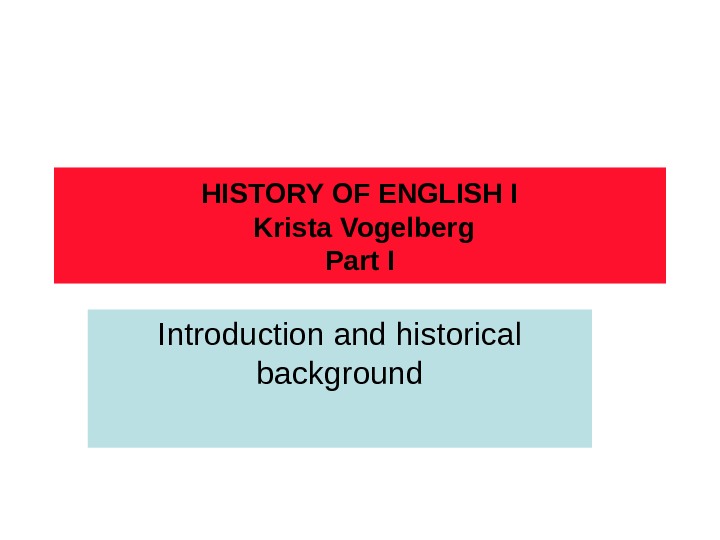
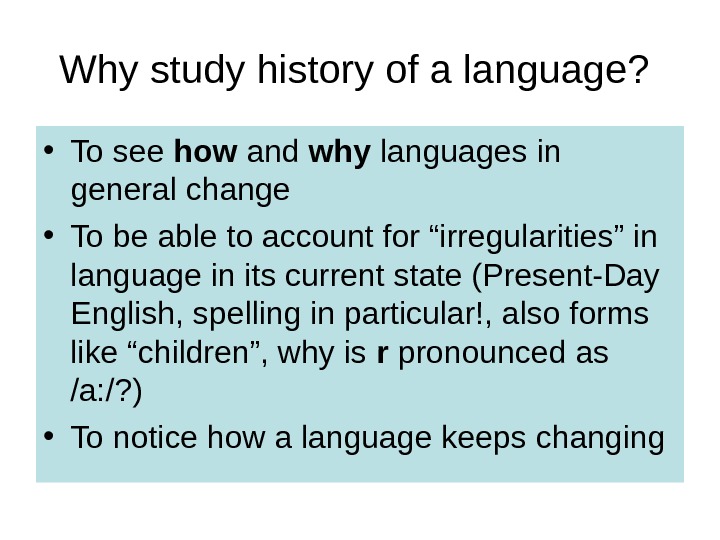
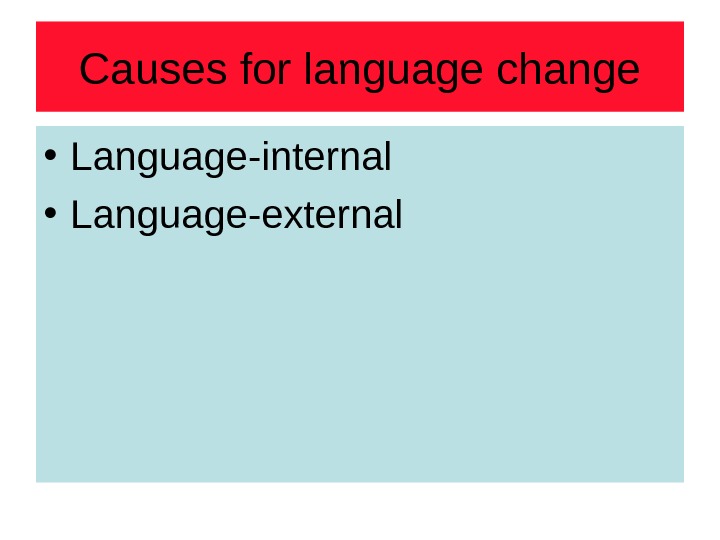
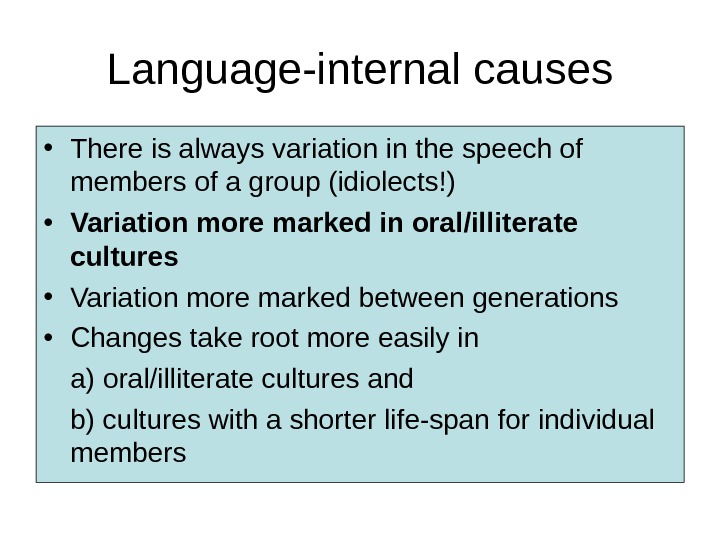
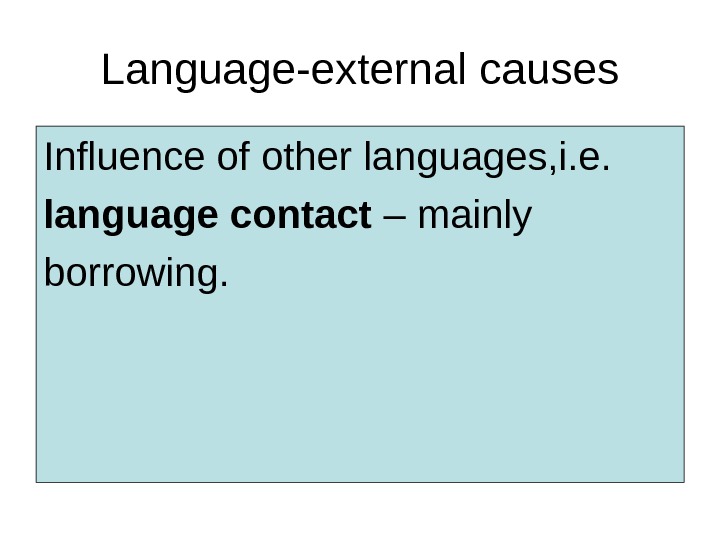
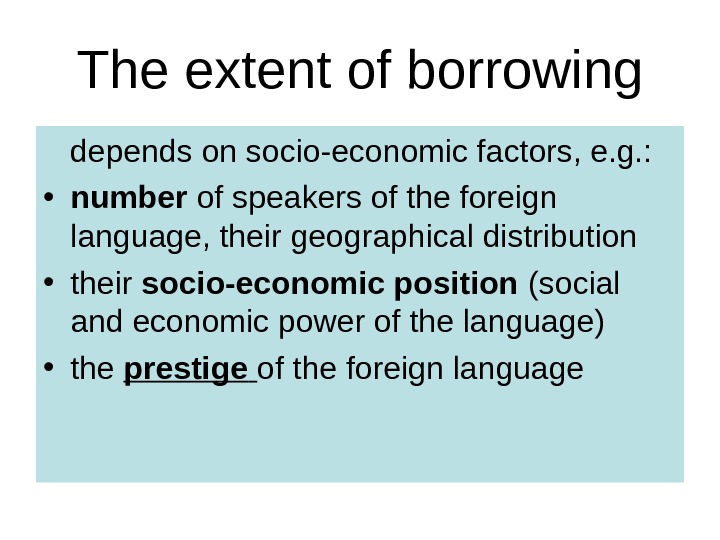
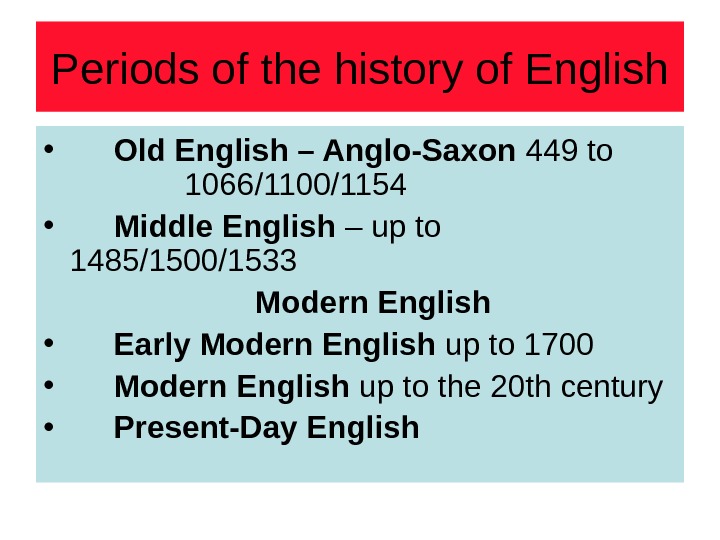
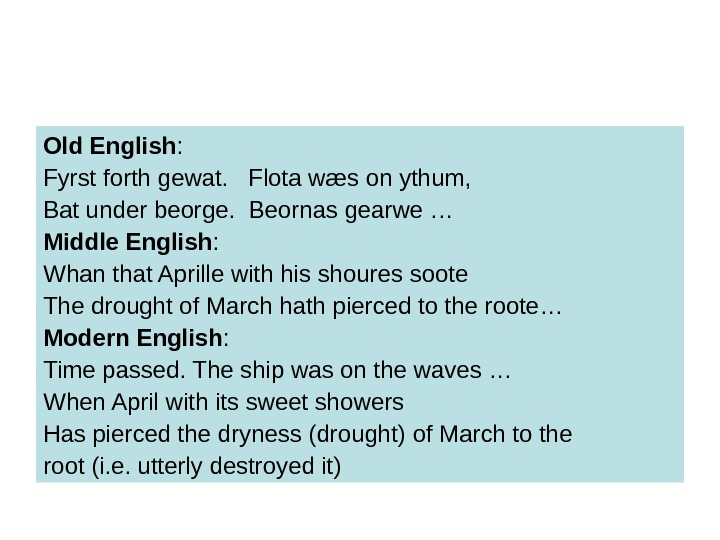
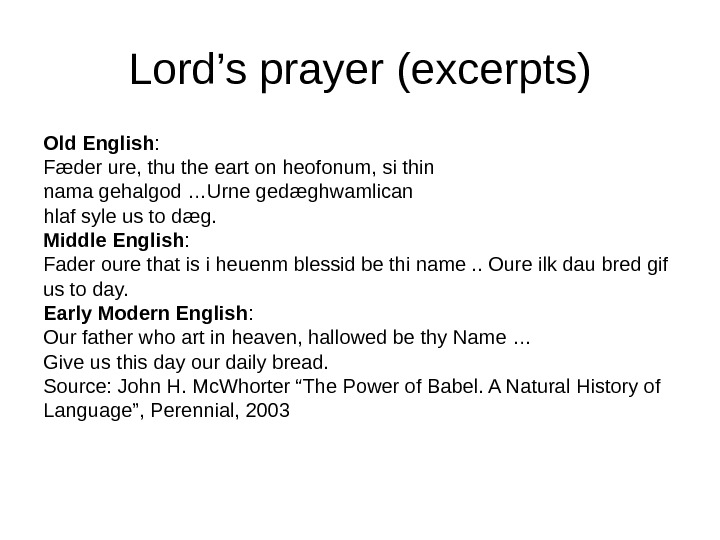
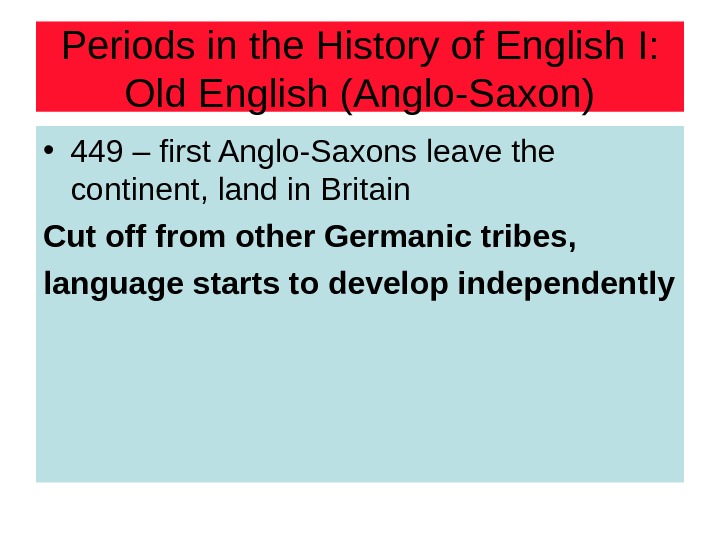
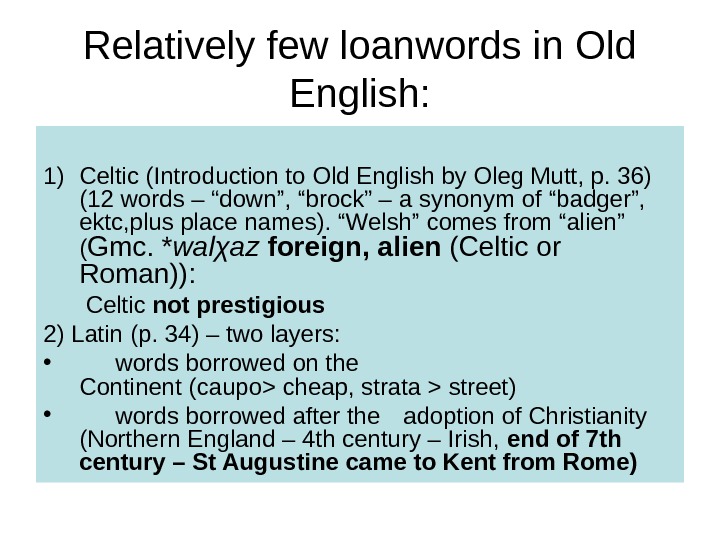
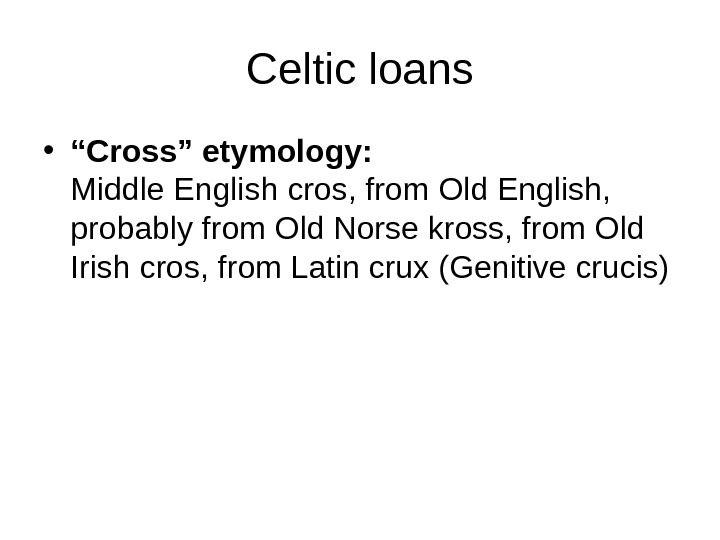
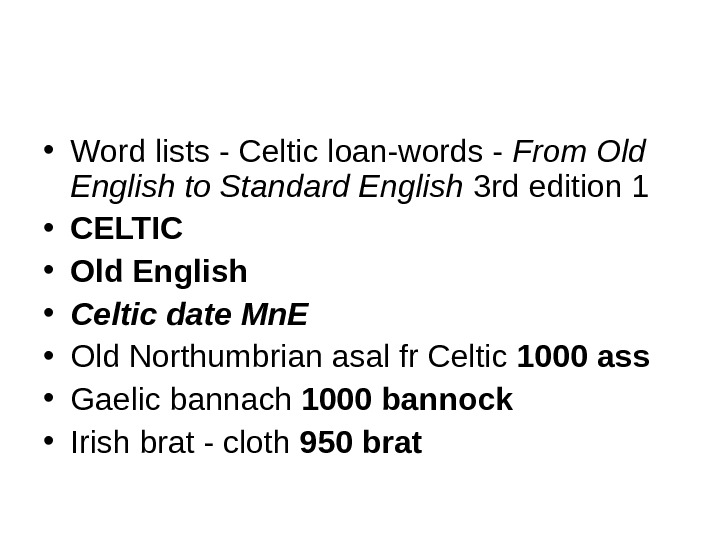
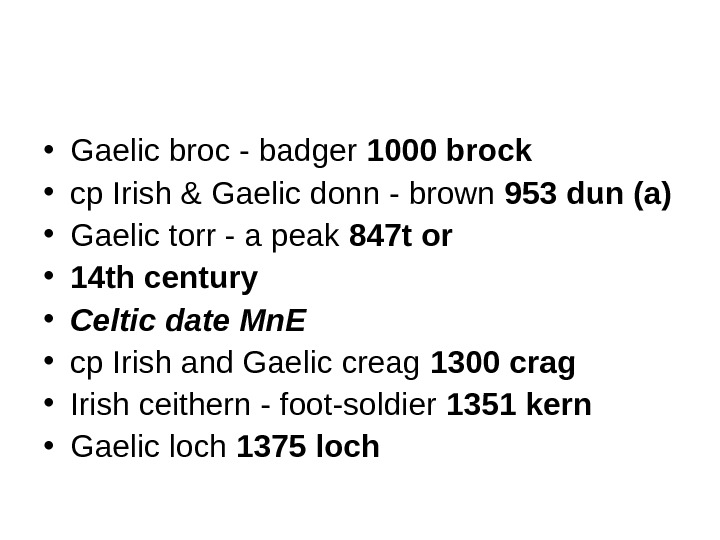
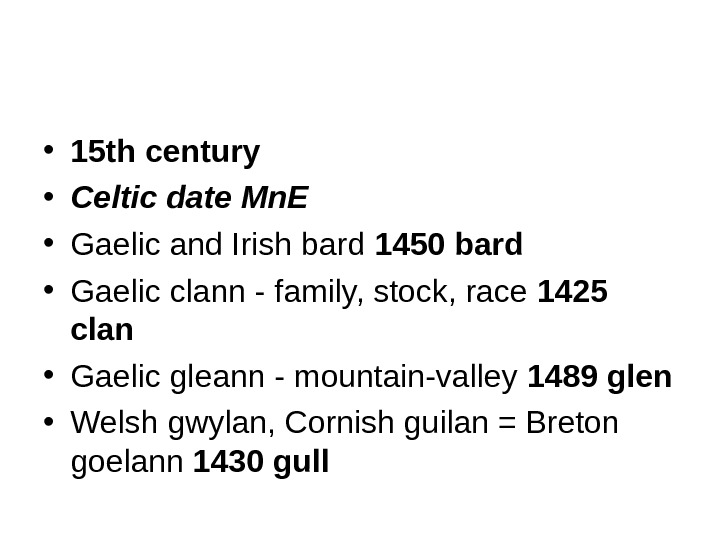
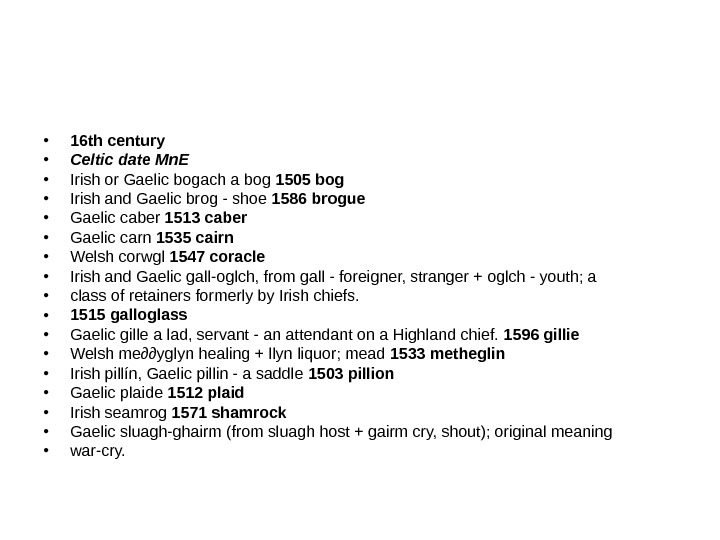
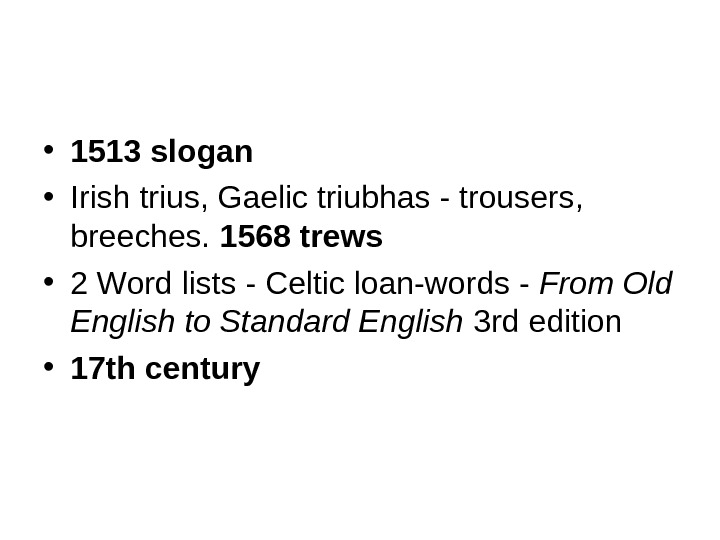
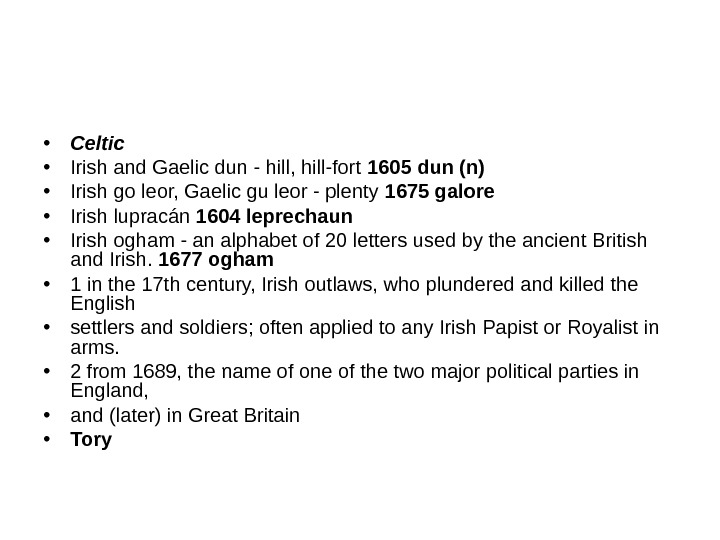
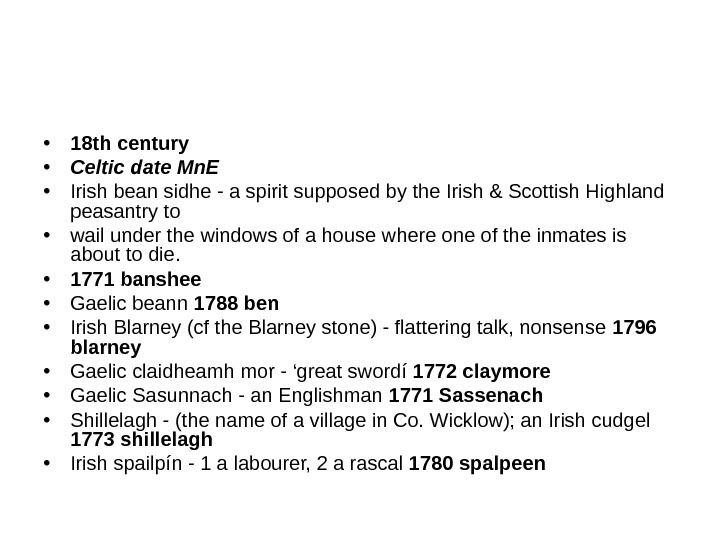
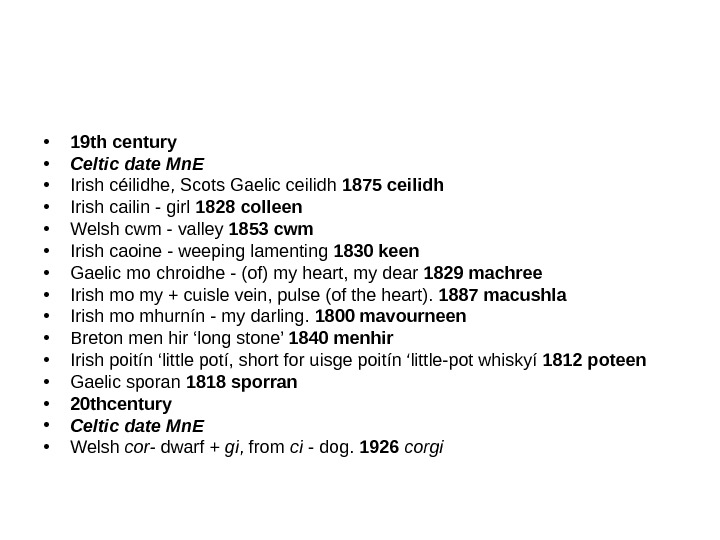
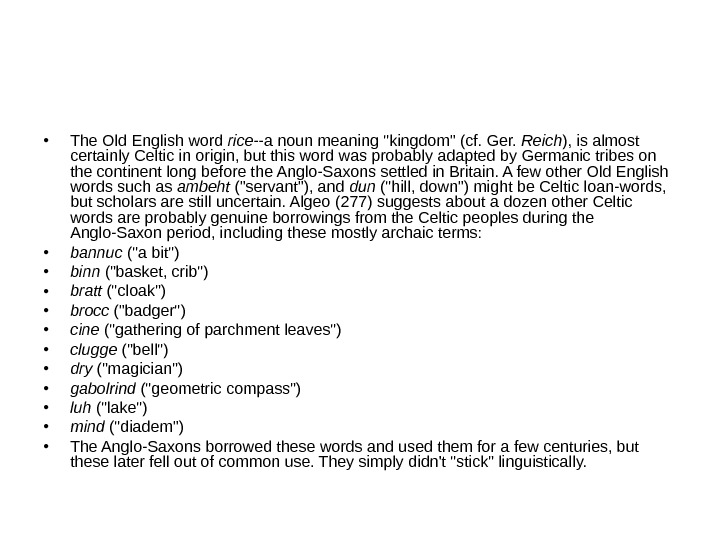
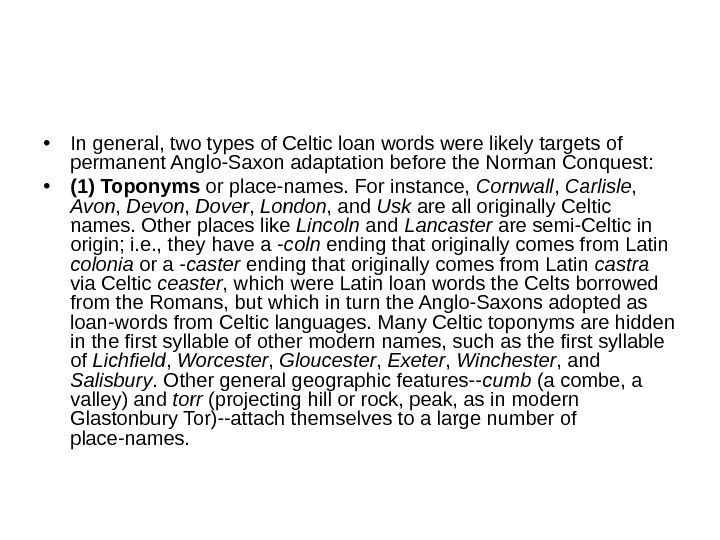
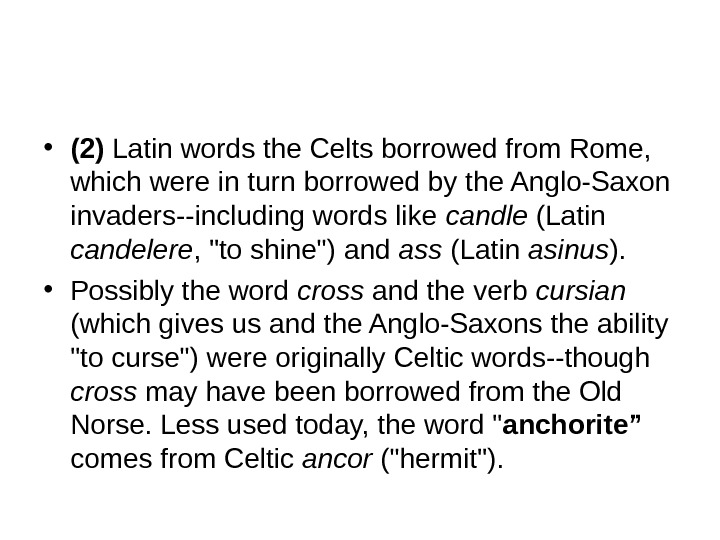
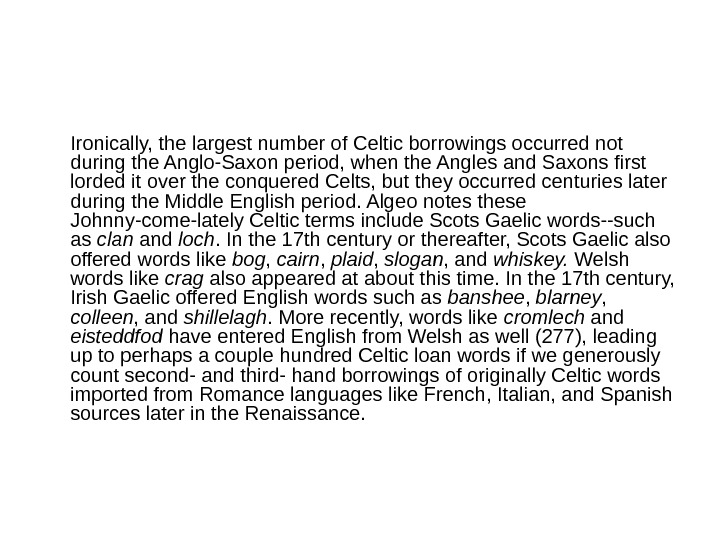
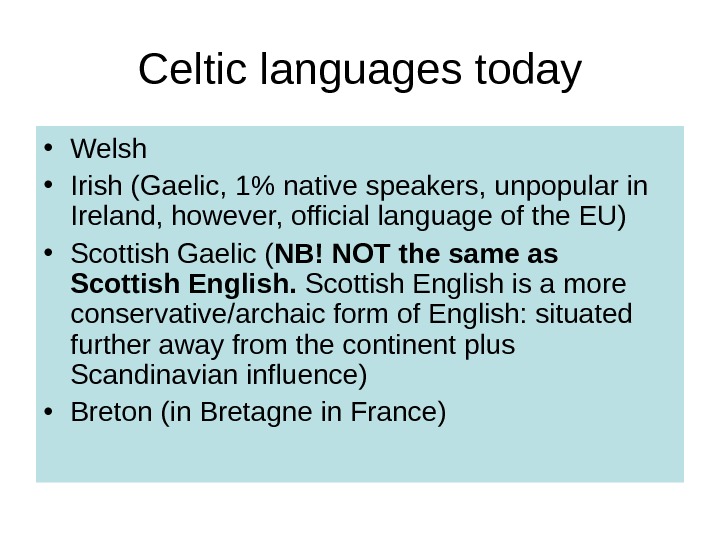
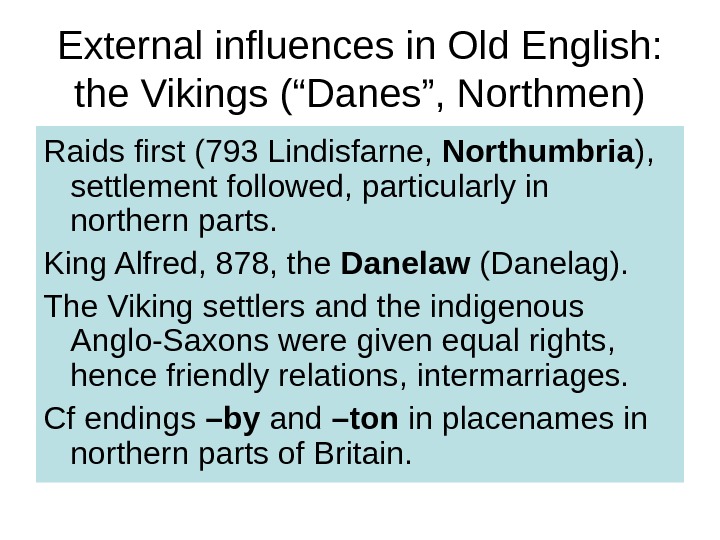
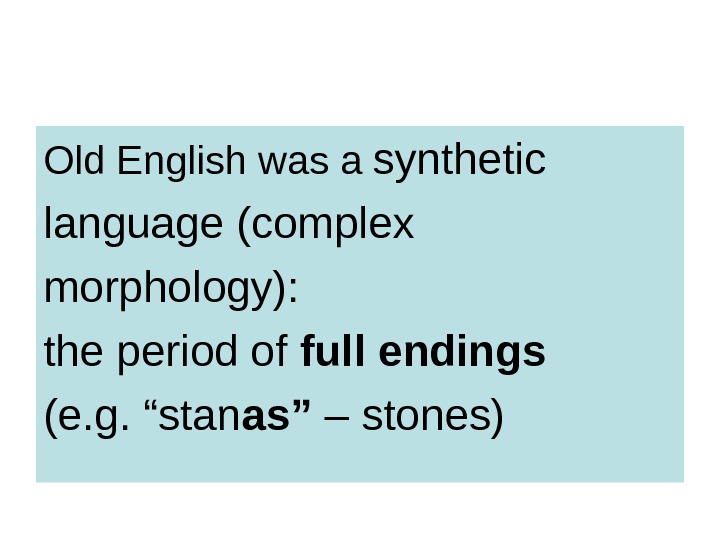
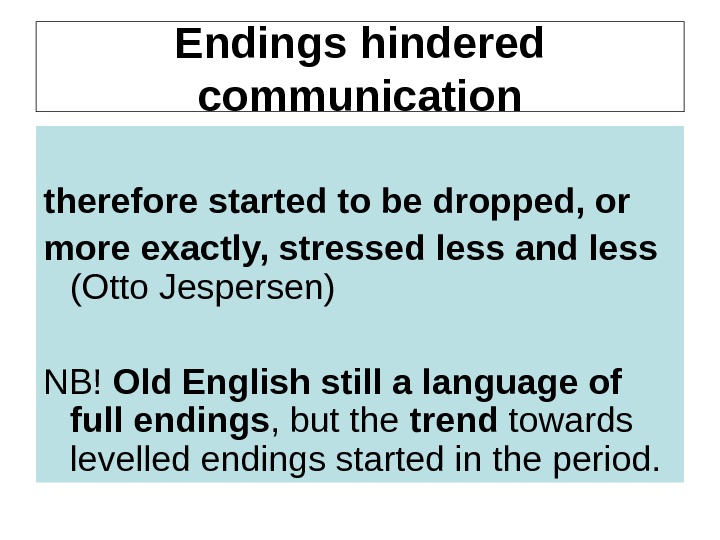
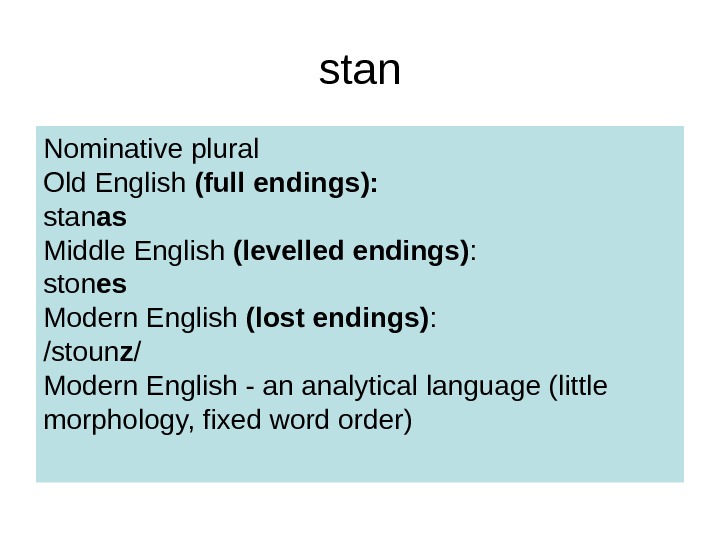
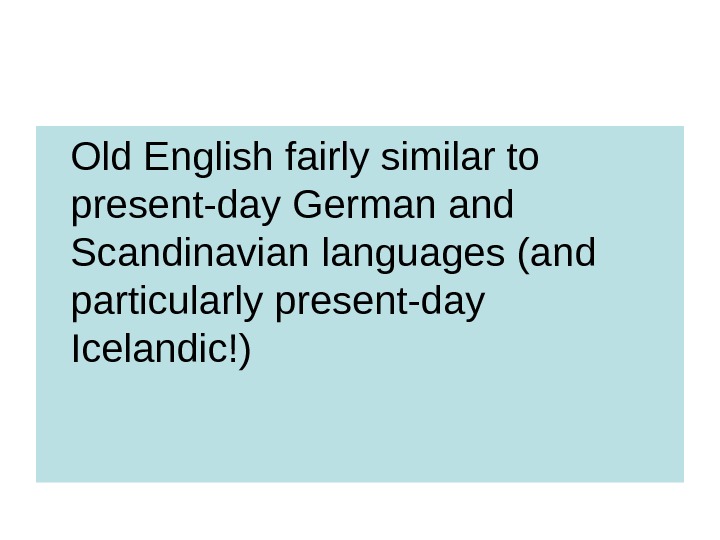
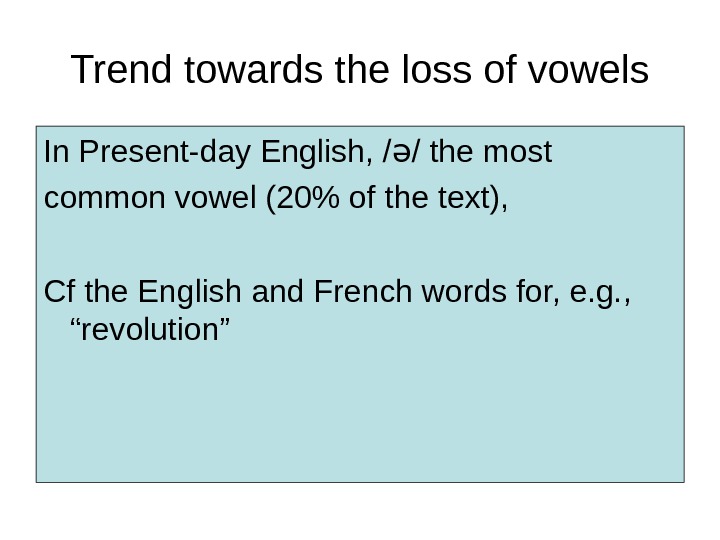
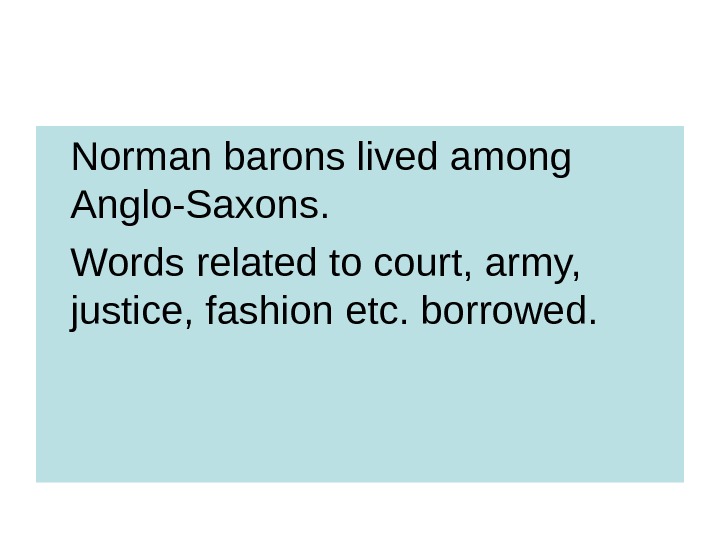
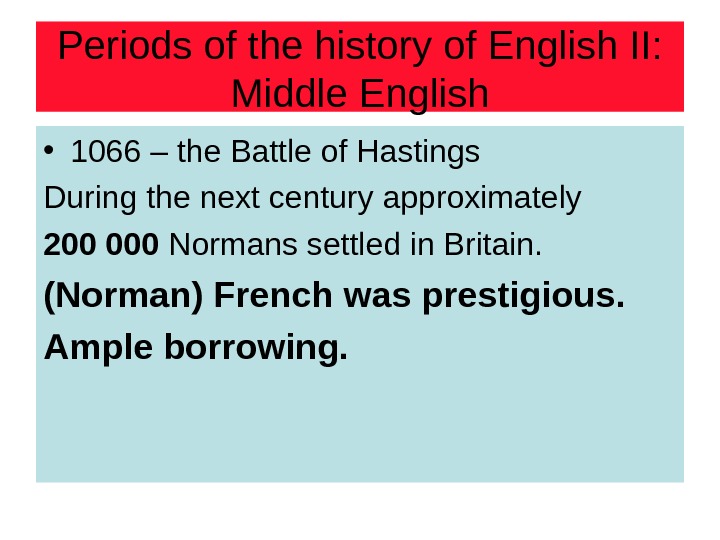
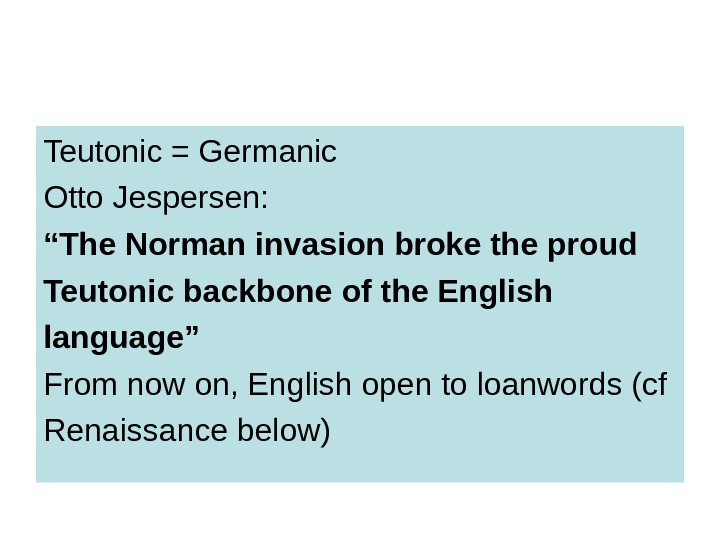
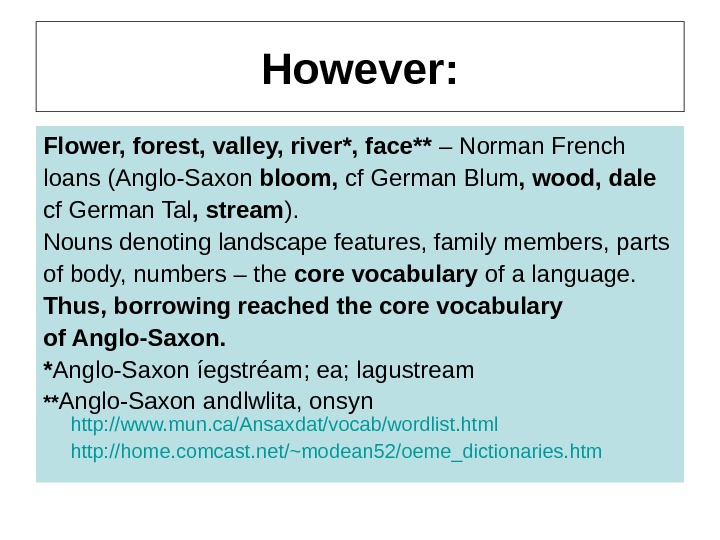
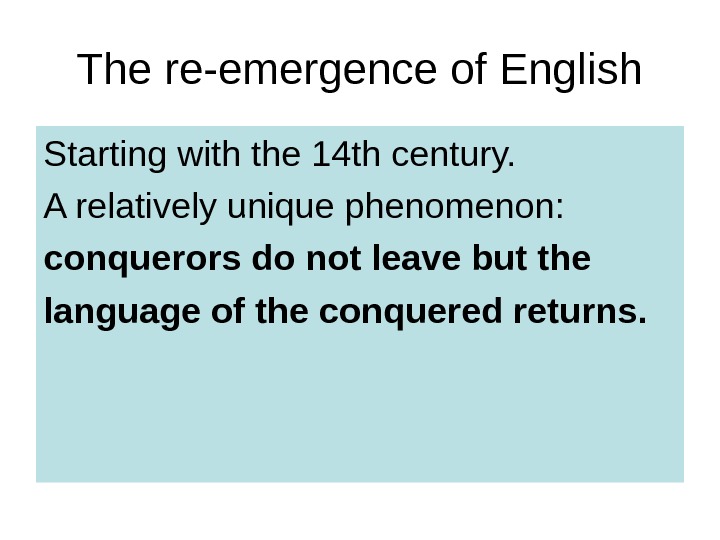
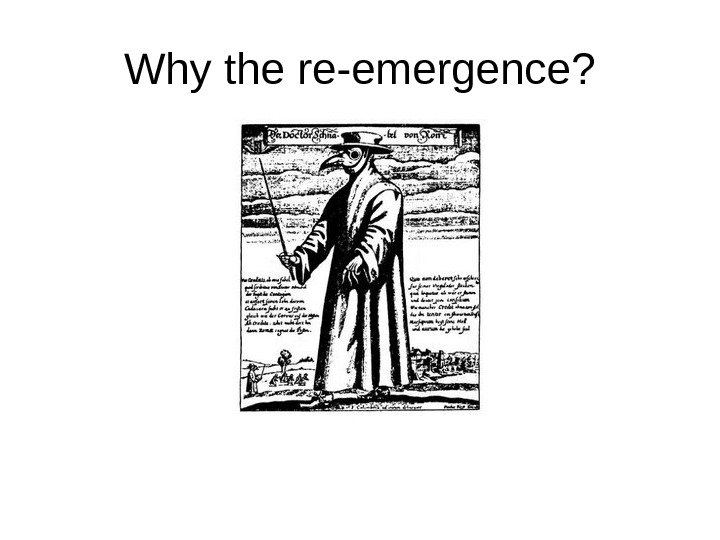
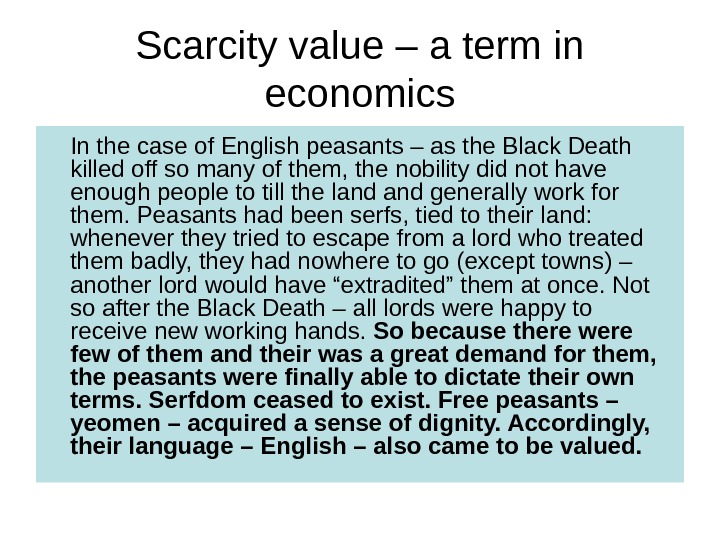
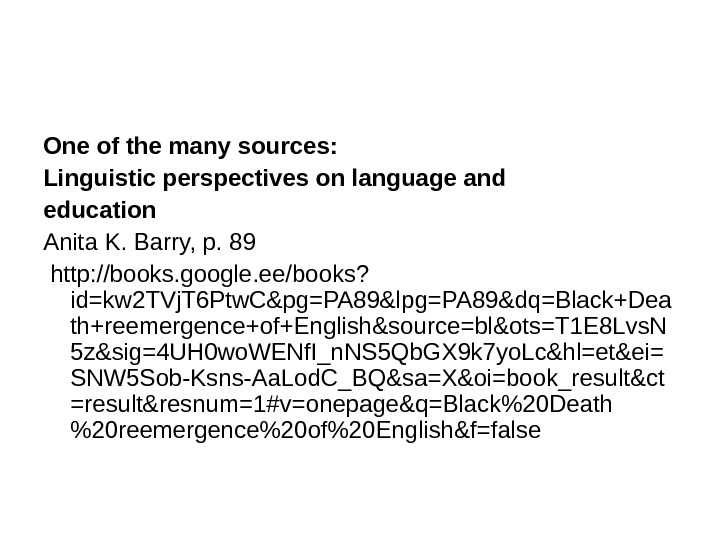
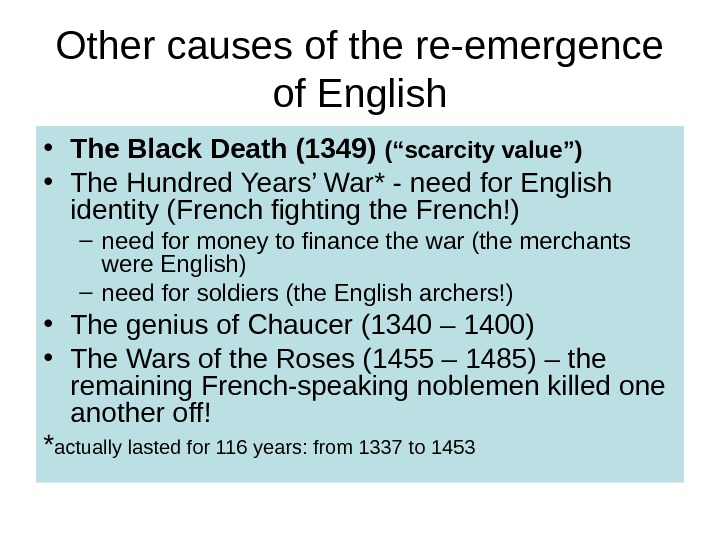
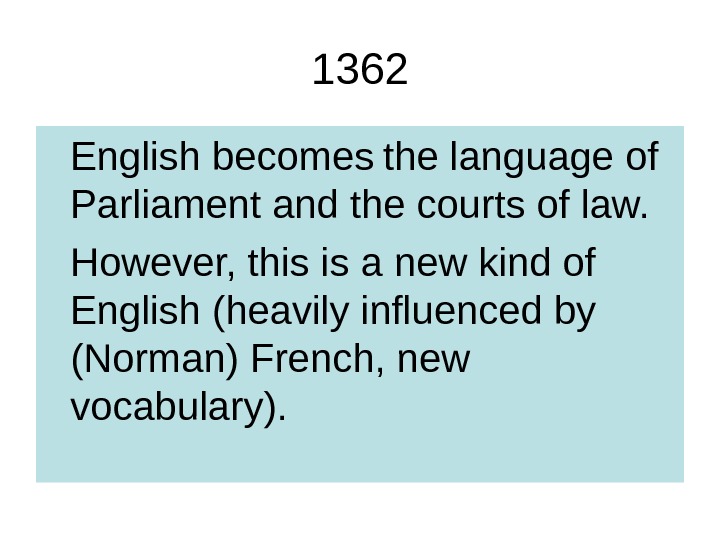
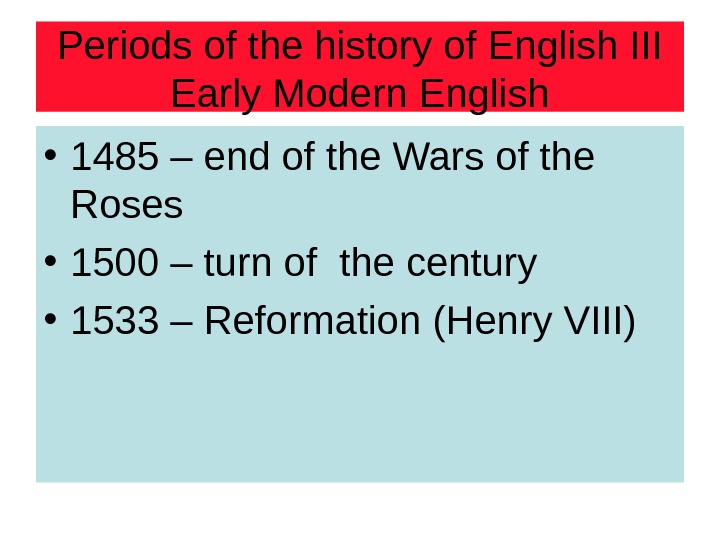
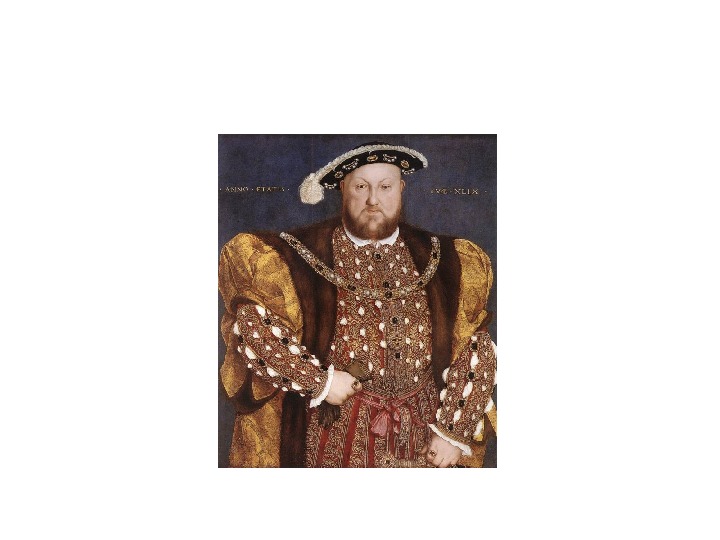
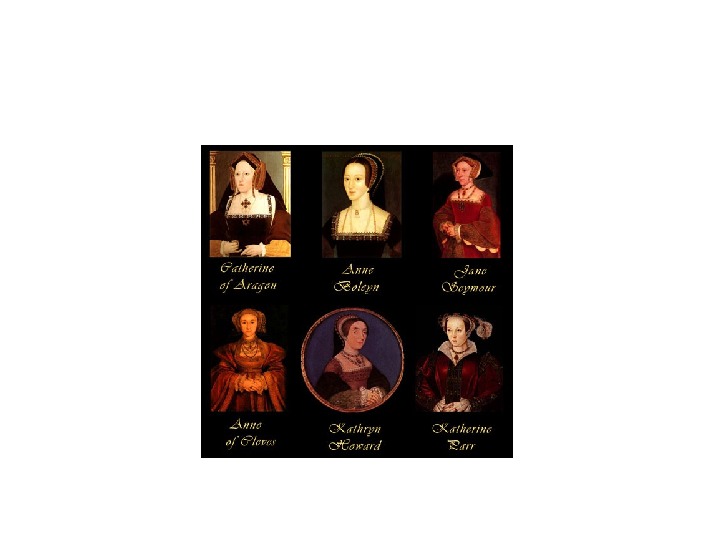
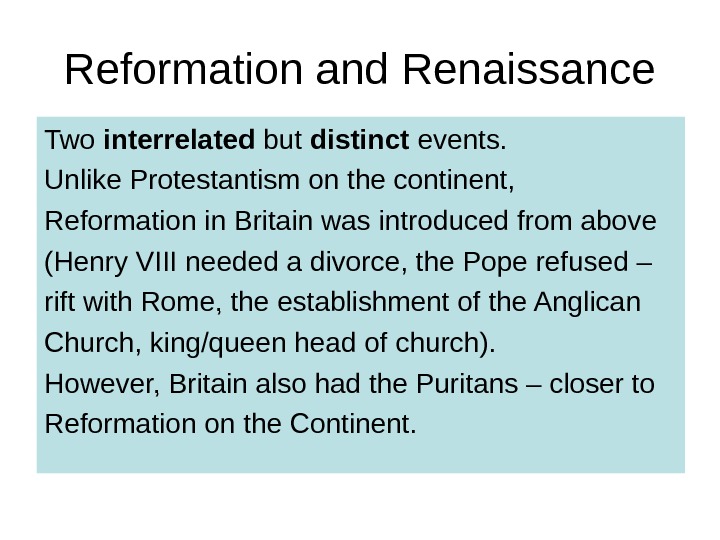
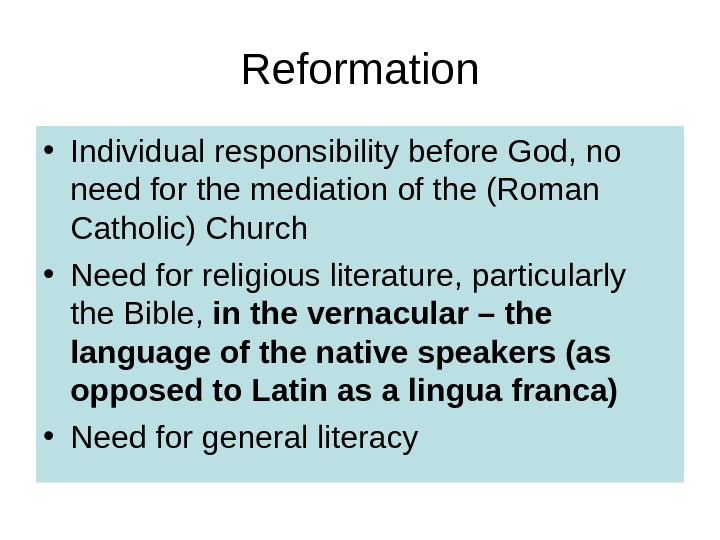
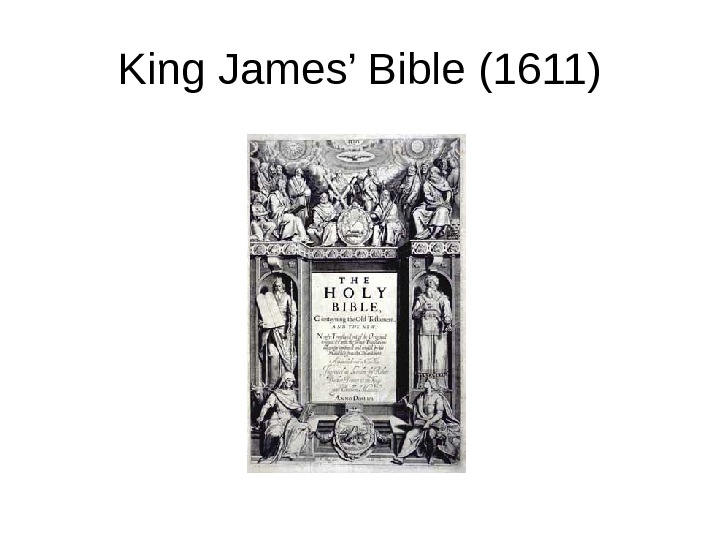
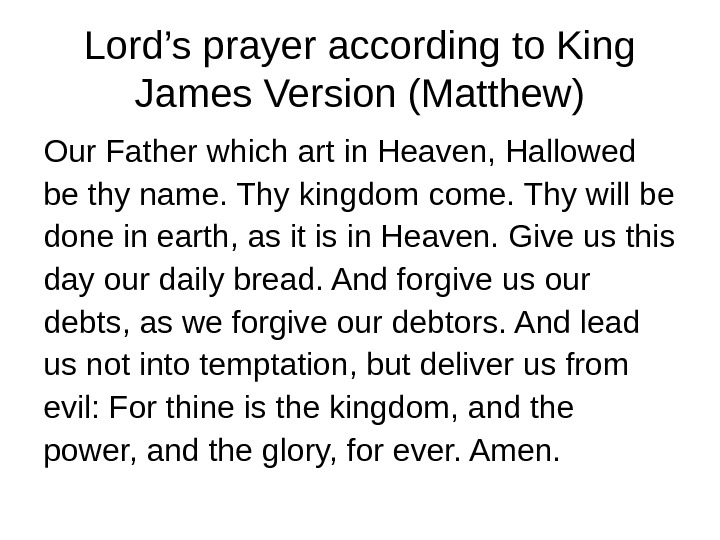

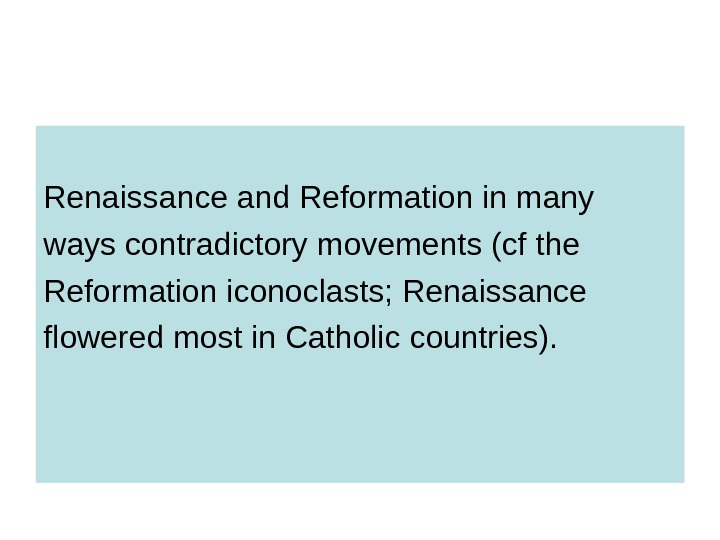
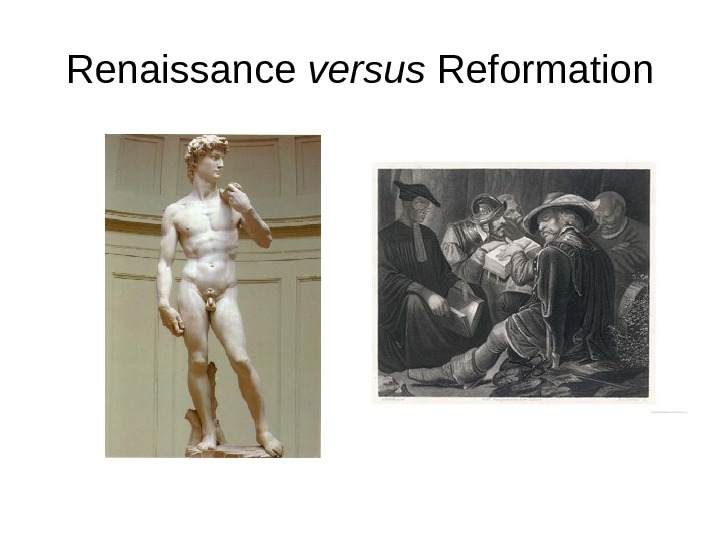
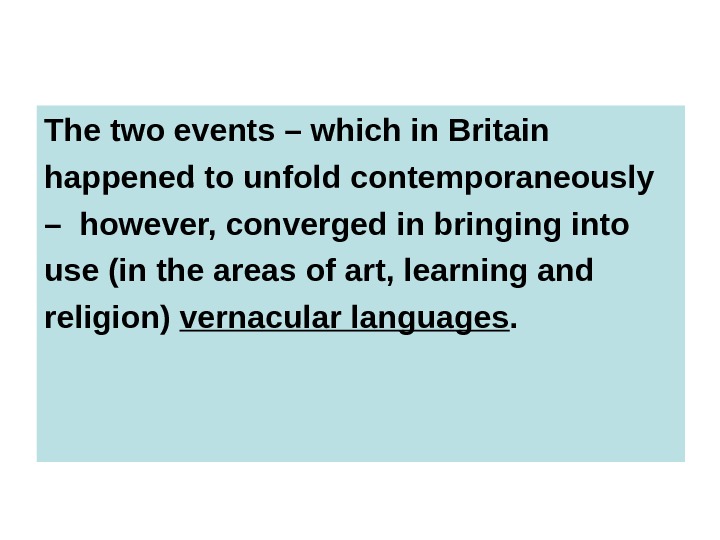
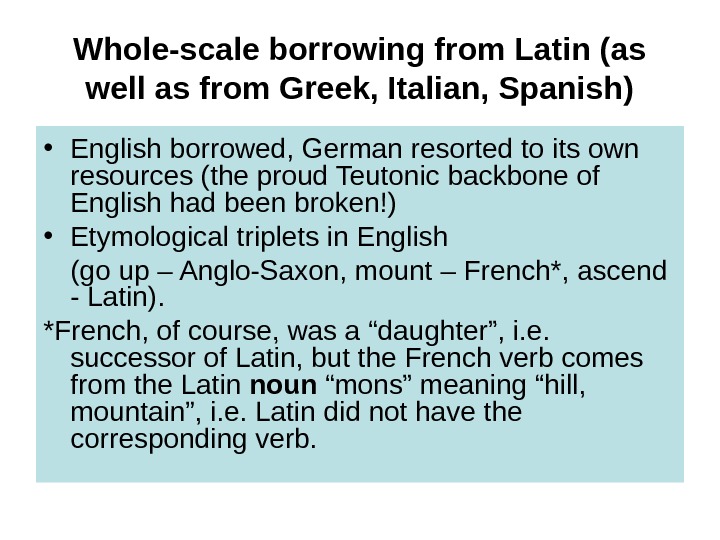
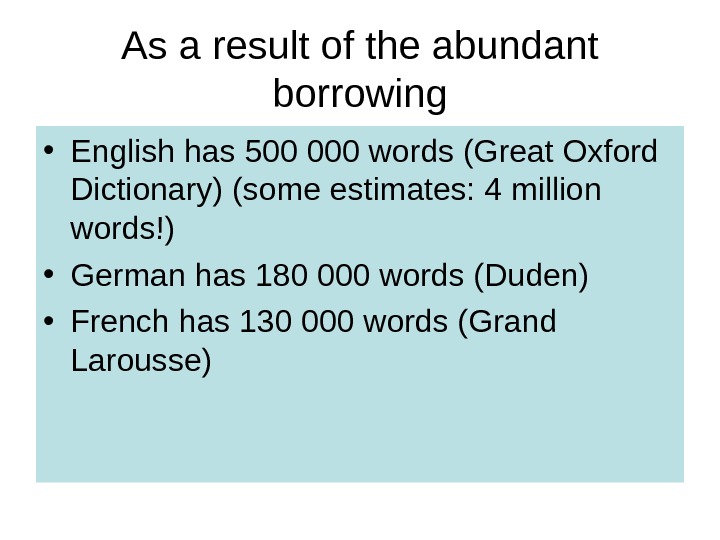
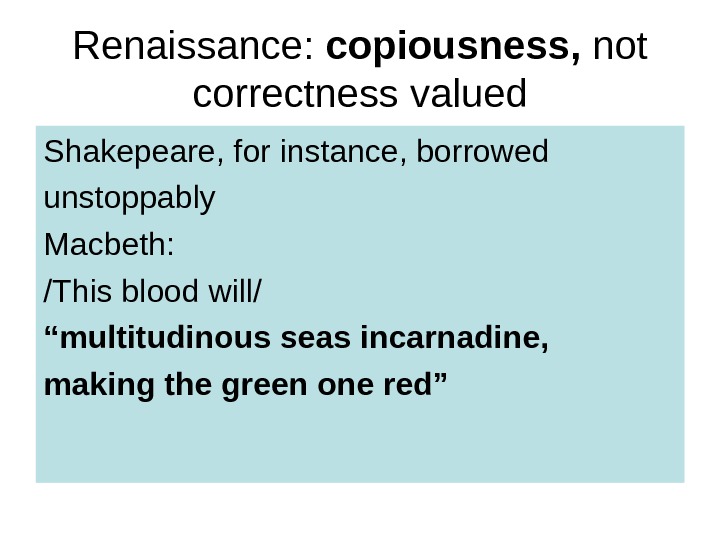
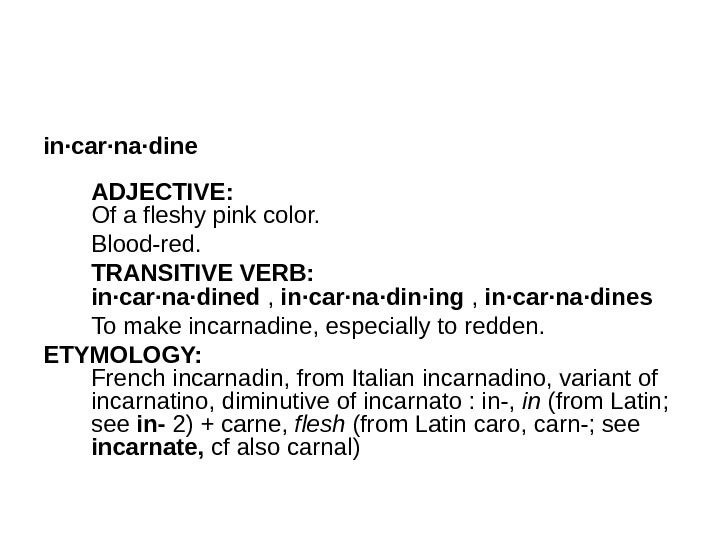

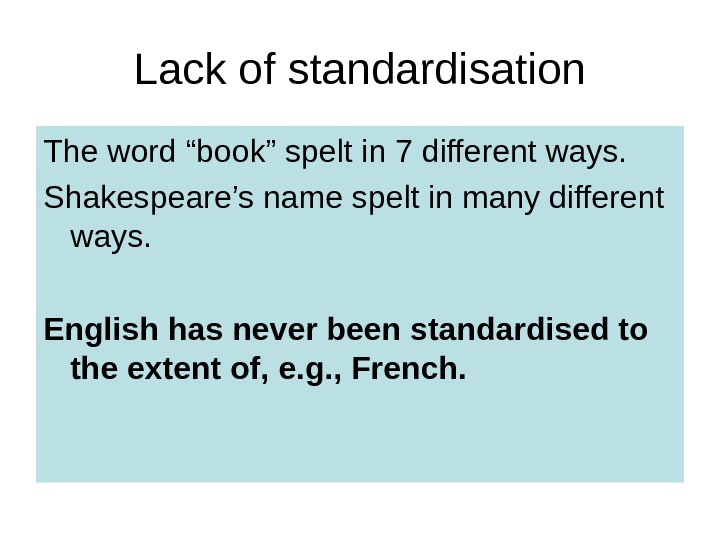
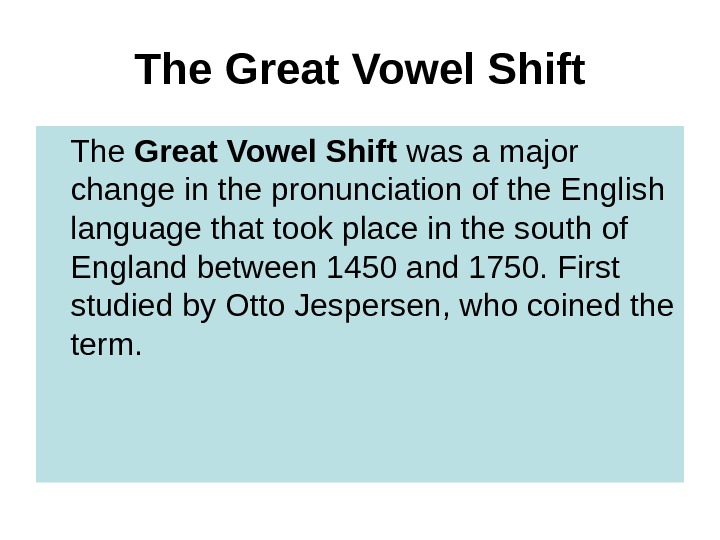
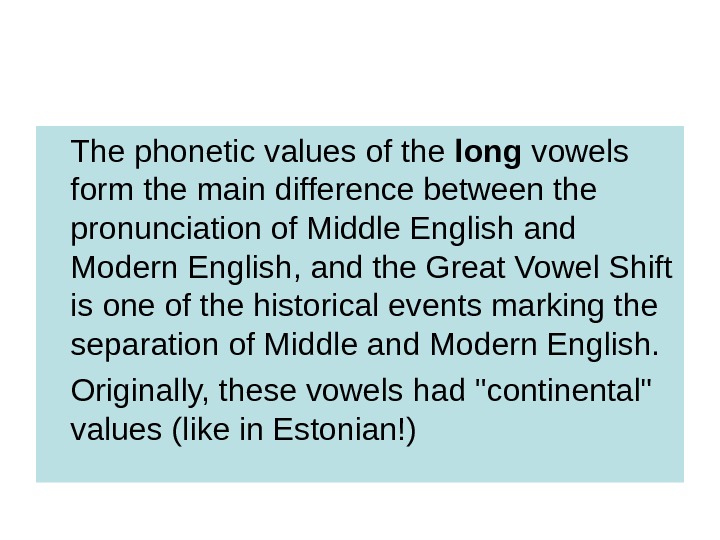
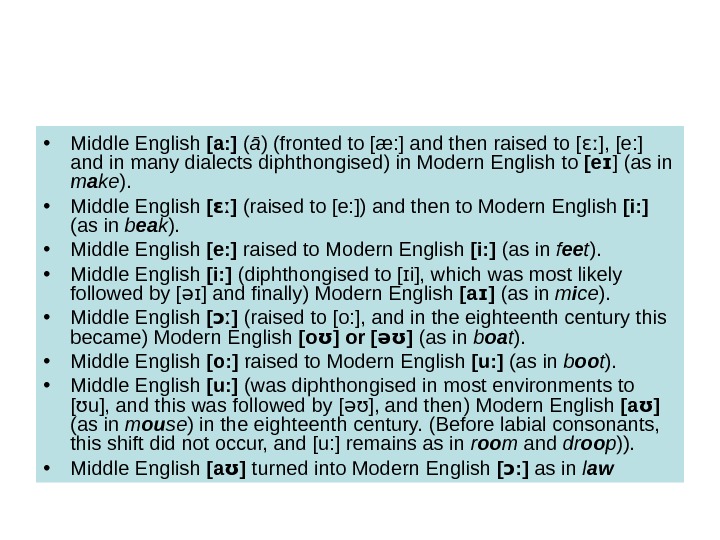

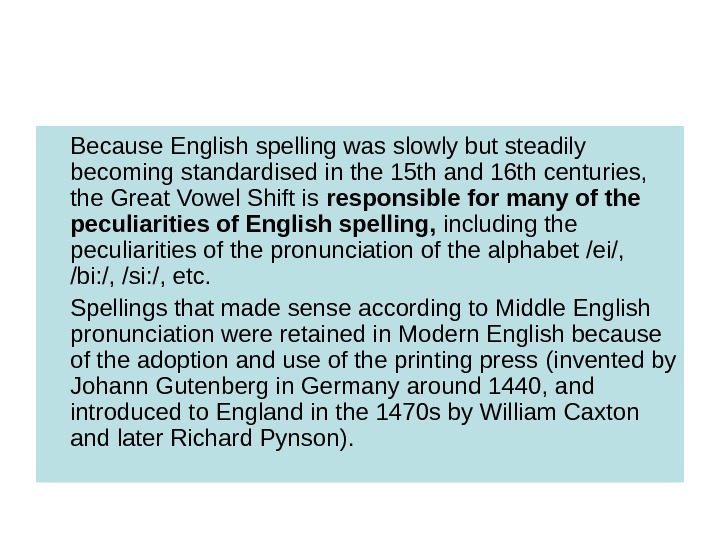

history_of_english_i_part_1_2010_1.ppt
- Размер: 528.5 Кб
- Количество слайдов: 64
Описание презентации HISTORY OF ENGLISH I Krista Vogelberg Part по слайдам
 HISTORY OF ENGLISH I Krista Vogelberg Part I Introduction and historical background
HISTORY OF ENGLISH I Krista Vogelberg Part I Introduction and historical background
 Why study history of a language? • To see how and why languages in general change • To be able to account for “irregularities” in language in its current state (Present-Day English, spelling in particular!, also forms like “children”, why is r pronounced as /a: /? ) • To notice how a language keeps changing
Why study history of a language? • To see how and why languages in general change • To be able to account for “irregularities” in language in its current state (Present-Day English, spelling in particular!, also forms like “children”, why is r pronounced as /a: /? ) • To notice how a language keeps changing
 Causes for language change • Language-internal • Language-external
Causes for language change • Language-internal • Language-external
 Language-internal causes • There is always variation in the speech of members of a group (idiolects!) • Variation more marked in oral/illiterate cultures • Variation more marked between generations • Changes take root more easily in a) oral/illiterate cultures and b) cultures with a shorter life-span for individual members
Language-internal causes • There is always variation in the speech of members of a group (idiolects!) • Variation more marked in oral/illiterate cultures • Variation more marked between generations • Changes take root more easily in a) oral/illiterate cultures and b) cultures with a shorter life-span for individual members
 Language-external causes Influence of other languages, i. e. language contact – mainly borrowing.
Language-external causes Influence of other languages, i. e. language contact – mainly borrowing.
 The extent of borrowing depends on socio-economic factors, e. g. : • number of speakers of the foreign language, their geographical distribution • their socio-economic position (social and economic power of the language) • the prestige of the foreign language
The extent of borrowing depends on socio-economic factors, e. g. : • number of speakers of the foreign language, their geographical distribution • their socio-economic position (social and economic power of the language) • the prestige of the foreign language
 Periods of the history of English • Old English – Anglo-Saxon 449 to 1066/1100/1154 • Middle English – up to 1485/1500/1533 Modern English • Early Modern English up to 1700 • Modern English up to the 20 th century • Present-Day English
Periods of the history of English • Old English – Anglo-Saxon 449 to 1066/1100/1154 • Middle English – up to 1485/1500/1533 Modern English • Early Modern English up to 1700 • Modern English up to the 20 th century • Present-Day English
 Old English : Fyrst forth gewat. Flota w æ s on ythum, Bat under beorge. Beornas gearwe … Middle English : Whan that Aprille with his shoures soote The drought of March hath pierced to the roote… Modern English : Time passed. The ship was on the waves … When April with its sweet showers Has pierced the dryness (drought) of March to the root (i. e. utterly destroyed it)
Old English : Fyrst forth gewat. Flota w æ s on ythum, Bat under beorge. Beornas gearwe … Middle English : Whan that Aprille with his shoures soote The drought of March hath pierced to the roote… Modern English : Time passed. The ship was on the waves … When April with its sweet showers Has pierced the dryness (drought) of March to the root (i. e. utterly destroyed it)
 Lord’s prayer (excerpts) Old English : F æ der ure, thu the eart on heofonum, si thin nama gehalgod …Urne ged æ ghwamlican hlaf syle us to d æ g. Middle English : Fader oure that is i heuenm blessid be thi name. . Oure ilk dau bred gif us to day. Early Modern English : Our father who art in heaven, hallowed be thy Name … Give us this day our daily bread. Source: John H. Mc. Whorter “The Power of Babel. A Natural History of Language”, Perennial,
Lord’s prayer (excerpts) Old English : F æ der ure, thu the eart on heofonum, si thin nama gehalgod …Urne ged æ ghwamlican hlaf syle us to d æ g. Middle English : Fader oure that is i heuenm blessid be thi name. . Oure ilk dau bred gif us to day. Early Modern English : Our father who art in heaven, hallowed be thy Name … Give us this day our daily bread. Source: John H. Mc. Whorter “The Power of Babel. A Natural History of Language”, Perennial,
 Periods in the History of English I: Old English (Anglo-Saxon) • 449 – first Anglo-Saxons leave the continent, land in Britain Cut off from other Germanic tribes, language starts to develop independently
Periods in the History of English I: Old English (Anglo-Saxon) • 449 – first Anglo-Saxons leave the continent, land in Britain Cut off from other Germanic tribes, language starts to develop independently
 Relatively few loanwords in Old English: 1) Celtic (Introduction to Old English by Oleg Mutt, p. 36) (12 words – “down”, “brock” – a synonym of “badger”, ektc, plus place names). “Welsh” comes from “alien” ( Gmc. * walχaz foreign , alien (Celtic or Roman) ): Celtic not prestigious 2) Latin (p. 34) – two layers: • words borrowed on the Continent (caupo> cheap, strata > street) • words borrowed after the adoption of Christianity (Northern England – 4 th century – Irish, end of 7 th century – St Augustine came to Kent from Rome)
Relatively few loanwords in Old English: 1) Celtic (Introduction to Old English by Oleg Mutt, p. 36) (12 words – “down”, “brock” – a synonym of “badger”, ektc, plus place names). “Welsh” comes from “alien” ( Gmc. * walχaz foreign , alien (Celtic or Roman) ): Celtic not prestigious 2) Latin (p. 34) – two layers: • words borrowed on the Continent (caupo> cheap, strata > street) • words borrowed after the adoption of Christianity (Northern England – 4 th century – Irish, end of 7 th century – St Augustine came to Kent from Rome)
 Celtic loans • “ Cross” etymology: Middle English cros, from Old English, probably from Old Norse kross, from Old Irish cros, from Latin crux (Genitive crucis)
Celtic loans • “ Cross” etymology: Middle English cros, from Old English, probably from Old Norse kross, from Old Irish cros, from Latin crux (Genitive crucis)
 • Word lists — Celtic loan-words — From Old English to Standard English 3 rd edition 1 • CELTIC • Old English • Celtic date Mn. E • Old Northumbrian asal fr Celtic 1000 ass • Gaelic bannach 1000 bannock • Irish brat — cloth 950 brat
• Word lists — Celtic loan-words — From Old English to Standard English 3 rd edition 1 • CELTIC • Old English • Celtic date Mn. E • Old Northumbrian asal fr Celtic 1000 ass • Gaelic bannach 1000 bannock • Irish brat — cloth 950 brat
 • Gaelic broc — badger 1000 brock • cp Irish & Gaelic donn — brown 953 dun (a) • Gaelic torr — a peak 847 t or • 14 th century • Celtic date Mn. E • cp Irish and Gaelic creag 1300 crag • Irish ceithern — foot-soldier 1351 kern • Gaelic loch 1375 loch
• Gaelic broc — badger 1000 brock • cp Irish & Gaelic donn — brown 953 dun (a) • Gaelic torr — a peak 847 t or • 14 th century • Celtic date Mn. E • cp Irish and Gaelic creag 1300 crag • Irish ceithern — foot-soldier 1351 kern • Gaelic loch 1375 loch
 • 15 th century • Celtic date Mn. E • Gaelic and Irish bard 1450 bard • Gaelic clann — family, stock, race 1425 clan • Gaelic gleann — mountain-valley 1489 glen • Welsh gwylan, Cornish guilan = Breton goelann 1430 gull
• 15 th century • Celtic date Mn. E • Gaelic and Irish bard 1450 bard • Gaelic clann — family, stock, race 1425 clan • Gaelic gleann — mountain-valley 1489 glen • Welsh gwylan, Cornish guilan = Breton goelann 1430 gull
 • 16 th century • Celtic date Mn. E • Irish or Gaelic bogach a bog 1505 bog • Irish and Gaelic brog — shoe 1586 brogue • Gaelic caber 1513 caber • Gaelic carn 1535 cairn • Welsh corwgl 1547 coracle • Irish and Gaelic gall-oglch, from gall — foreigner, stranger + oglch — youth; a • class of retainers formerly by Irish chiefs. • 1515 galloglass • Gaelic gille a lad, servant — an attendant on a Highland chief. 1596 gillie • Welsh me∂∂yglyn healing + llyn liquor; mead 1533 metheglin • Irish pillín, Gaelic pillin — a saddle 1503 pillion • Gaelic plaide 1512 plaid • Irish seamrog 1571 shamrock • Gaelic sluagh-ghairm (from sluagh host + gairm cry, shout); original meaning • war-cry.
• 16 th century • Celtic date Mn. E • Irish or Gaelic bogach a bog 1505 bog • Irish and Gaelic brog — shoe 1586 brogue • Gaelic caber 1513 caber • Gaelic carn 1535 cairn • Welsh corwgl 1547 coracle • Irish and Gaelic gall-oglch, from gall — foreigner, stranger + oglch — youth; a • class of retainers formerly by Irish chiefs. • 1515 galloglass • Gaelic gille a lad, servant — an attendant on a Highland chief. 1596 gillie • Welsh me∂∂yglyn healing + llyn liquor; mead 1533 metheglin • Irish pillín, Gaelic pillin — a saddle 1503 pillion • Gaelic plaide 1512 plaid • Irish seamrog 1571 shamrock • Gaelic sluagh-ghairm (from sluagh host + gairm cry, shout); original meaning • war-cry.
 • 1513 slogan • Irish trius, Gaelic triubhas — trousers, breeches. 1568 trews • 2 Word lists — Celtic loan-words — From Old English to Standard English 3 rd edition • 17 th century
• 1513 slogan • Irish trius, Gaelic triubhas — trousers, breeches. 1568 trews • 2 Word lists — Celtic loan-words — From Old English to Standard English 3 rd edition • 17 th century
 • Celtic • Irish and Gaelic dun — hill, hill-fort 1605 dun (n) • Irish go leor, Gaelic gu leor — plenty 1675 galore • Irish lupracán 1604 leprechaun • Irish ogham — an alphabet of 20 letters used by the ancient British and Irish. 1677 ogham • 1 in the 17 th century, Irish outlaws, who plundered and killed the English • settlers and soldiers; often applied to any Irish Papist or Royalist in arms. • 2 from 1689, the name of one of the two major political parties in England, • and (later) in Great Britain • Tory
• Celtic • Irish and Gaelic dun — hill, hill-fort 1605 dun (n) • Irish go leor, Gaelic gu leor — plenty 1675 galore • Irish lupracán 1604 leprechaun • Irish ogham — an alphabet of 20 letters used by the ancient British and Irish. 1677 ogham • 1 in the 17 th century, Irish outlaws, who plundered and killed the English • settlers and soldiers; often applied to any Irish Papist or Royalist in arms. • 2 from 1689, the name of one of the two major political parties in England, • and (later) in Great Britain • Tory
 • 18 th century • Celtic date Mn. E • Irish bean sidhe — a spirit supposed by the Irish & Scottish Highland peasantry to • wail under the windows of a house where one of the inmates is about to die. • 1771 banshee • Gaelic beann 1788 ben • Irish Blarney (cf the Blarney stone) — flattering talk, nonsense 1796 blarney • Gaelic claidheamh mor — ‘great swordí 1772 claymore • Gaelic Sasunnach — an Englishman 1771 Sassenach • Shillelagh — (the name of a village in Co. Wicklow); an Irish cudgel 1773 shillelagh • Irish spailpín — 1 a labourer, 2 a rascal 1780 spalpeen
• 18 th century • Celtic date Mn. E • Irish bean sidhe — a spirit supposed by the Irish & Scottish Highland peasantry to • wail under the windows of a house where one of the inmates is about to die. • 1771 banshee • Gaelic beann 1788 ben • Irish Blarney (cf the Blarney stone) — flattering talk, nonsense 1796 blarney • Gaelic claidheamh mor — ‘great swordí 1772 claymore • Gaelic Sasunnach — an Englishman 1771 Sassenach • Shillelagh — (the name of a village in Co. Wicklow); an Irish cudgel 1773 shillelagh • Irish spailpín — 1 a labourer, 2 a rascal 1780 spalpeen
 • 19 th century • Celtic date Mn. E • Irish céilidhe, Scots Gaelic ceilidh 1875 ceilidh • Irish cailin — girl 1828 colleen • Welsh cwm — valley 1853 cwm • Irish caoine — weeping lamenting 1830 keen • Gaelic mo chroidhe — (of) my heart, my dear 1829 machree • Irish mo my + cuisle vein, pulse (of the heart). 1887 macushla • Irish mo mhurnín — my darling. 1800 mavourneen • Breton men hir ‘long stone’ 1840 menhir • Irish poitín ‘little potí, short for uisge poitín ‘little-pot whiskyí 1812 poteen • Gaelic sporan 1818 sporran • 20 thcentury • Celtic date Mn. E • Welsh cor- dwarf + gi , from ci — dog. 1926 corgi
• 19 th century • Celtic date Mn. E • Irish céilidhe, Scots Gaelic ceilidh 1875 ceilidh • Irish cailin — girl 1828 colleen • Welsh cwm — valley 1853 cwm • Irish caoine — weeping lamenting 1830 keen • Gaelic mo chroidhe — (of) my heart, my dear 1829 machree • Irish mo my + cuisle vein, pulse (of the heart). 1887 macushla • Irish mo mhurnín — my darling. 1800 mavourneen • Breton men hir ‘long stone’ 1840 menhir • Irish poitín ‘little potí, short for uisge poitín ‘little-pot whiskyí 1812 poteen • Gaelic sporan 1818 sporran • 20 thcentury • Celtic date Mn. E • Welsh cor- dwarf + gi , from ci — dog. 1926 corgi
 • The Old English word rice —a noun meaning «kingdom» (cf. Ger. Reich ), is almost certainly Celtic in origin, but this word was probably adapted by Germanic tribes on the continent long before the Anglo-Saxons settled in Britain. A few other Old English words such as ambeht («servant»), and dun («hill, down») might be Celtic loan-words, but scholars are still uncertain. Algeo (277) suggests about a dozen other Celtic words are probably genuine borrowings from the Celtic peoples during the Anglo-Saxon period, including these mostly archaic terms: • bannuc («a bit») • binn («basket, crib») • bratt («cloak») • brocc («badger») • cine («gathering of parchment leaves») • clugge («bell») • dry («magician») • gabolrind («geometric compass») • luh («lake») • mind («diadem») • The Anglo-Saxons borrowed these words and used them for a few centuries, but these later fell out of common use. They simply didn’t «stick» linguistically.
• The Old English word rice —a noun meaning «kingdom» (cf. Ger. Reich ), is almost certainly Celtic in origin, but this word was probably adapted by Germanic tribes on the continent long before the Anglo-Saxons settled in Britain. A few other Old English words such as ambeht («servant»), and dun («hill, down») might be Celtic loan-words, but scholars are still uncertain. Algeo (277) suggests about a dozen other Celtic words are probably genuine borrowings from the Celtic peoples during the Anglo-Saxon period, including these mostly archaic terms: • bannuc («a bit») • binn («basket, crib») • bratt («cloak») • brocc («badger») • cine («gathering of parchment leaves») • clugge («bell») • dry («magician») • gabolrind («geometric compass») • luh («lake») • mind («diadem») • The Anglo-Saxons borrowed these words and used them for a few centuries, but these later fell out of common use. They simply didn’t «stick» linguistically.
 • In general, two types of Celtic loan words were likely targets of permanent Anglo-Saxon adaptation before the Norman Conquest: • (1) Toponyms or place-names. For instance, Cornwall , Carlisle , Avon , Devon , Dover , London , and Usk are all originally Celtic names. Other places like Lincoln and Lancaster are semi-Celtic in origin; i. e. , they have a — coln ending that originally comes from Latin colonia or a — caster ending that originally comes from Latin castra via Celtic ceaster , which were Latin loan words the Celts borrowed from the Romans, but which in turn the Anglo-Saxons adopted as loan-words from Celtic languages. Many Celtic toponyms are hidden in the first syllable of other modern names, such as the first syllable of Lichfield , Worcester , Gloucester , Exeter , Winchester , and Salisbury. Other general geographic features— cumb (a combe, a valley) and torr (projecting hill or rock, peak, as in modern Glastonbury Tor)—attach themselves to a large number of place-names.
• In general, two types of Celtic loan words were likely targets of permanent Anglo-Saxon adaptation before the Norman Conquest: • (1) Toponyms or place-names. For instance, Cornwall , Carlisle , Avon , Devon , Dover , London , and Usk are all originally Celtic names. Other places like Lincoln and Lancaster are semi-Celtic in origin; i. e. , they have a — coln ending that originally comes from Latin colonia or a — caster ending that originally comes from Latin castra via Celtic ceaster , which were Latin loan words the Celts borrowed from the Romans, but which in turn the Anglo-Saxons adopted as loan-words from Celtic languages. Many Celtic toponyms are hidden in the first syllable of other modern names, such as the first syllable of Lichfield , Worcester , Gloucester , Exeter , Winchester , and Salisbury. Other general geographic features— cumb (a combe, a valley) and torr (projecting hill or rock, peak, as in modern Glastonbury Tor)—attach themselves to a large number of place-names.
 • (2) Latin words the Celts borrowed from Rome, which were in turn borrowed by the Anglo-Saxon invaders—including words like candle (Latin candelere , «to shine») and ass (Latin asinus ). • Possibly the word cross and the verb cursian (which gives us and the Anglo-Saxons the ability «to curse») were originally Celtic words—though cross may have been borrowed from the Old Norse. Less used today, the word » anchorite ” comes from Celtic ancor («hermit»).
• (2) Latin words the Celts borrowed from Rome, which were in turn borrowed by the Anglo-Saxon invaders—including words like candle (Latin candelere , «to shine») and ass (Latin asinus ). • Possibly the word cross and the verb cursian (which gives us and the Anglo-Saxons the ability «to curse») were originally Celtic words—though cross may have been borrowed from the Old Norse. Less used today, the word » anchorite ” comes from Celtic ancor («hermit»).
 Ironically, the largest number of Celtic borrowings occurred not during the Anglo-Saxon period, when the Angles and Saxons first lorded it over the conquered Celts, but they occurred centuries later during the Middle English period. Algeo notes these Johnny-come-lately Celtic terms include Scots Gaelic words—such as clan and loch. In the 17 th century or thereafter, Scots Gaelic also offered words like bog , cairn , plaid , slogan , and whiskey. Welsh words like crag also appeared at about this time. In the 17 th century, Irish Gaelic offered English words such as banshee , blarney , colleen , and shillelagh. More recently, words like cromlech and eisteddfod have entered English from Welsh as well (277), leading up to perhaps a couple hundred Celtic loan words if we generously count second- and third- hand borrowings of originally Celtic words imported from Romance languages like French, Italian, and Spanish sources later in the Renaissance.
Ironically, the largest number of Celtic borrowings occurred not during the Anglo-Saxon period, when the Angles and Saxons first lorded it over the conquered Celts, but they occurred centuries later during the Middle English period. Algeo notes these Johnny-come-lately Celtic terms include Scots Gaelic words—such as clan and loch. In the 17 th century or thereafter, Scots Gaelic also offered words like bog , cairn , plaid , slogan , and whiskey. Welsh words like crag also appeared at about this time. In the 17 th century, Irish Gaelic offered English words such as banshee , blarney , colleen , and shillelagh. More recently, words like cromlech and eisteddfod have entered English from Welsh as well (277), leading up to perhaps a couple hundred Celtic loan words if we generously count second- and third- hand borrowings of originally Celtic words imported from Romance languages like French, Italian, and Spanish sources later in the Renaissance.
 Celtic languages today • Welsh • Irish (Gaelic, 1% native speakers, unpopular in Ireland, however, official language of the EU) • Scottish Gaelic ( NB! NOT the same as Scottish English is a more conservative/archaic form of English: situated further away from the continent plus Scandinavian influence) • Breton (in Bretagne in France)
Celtic languages today • Welsh • Irish (Gaelic, 1% native speakers, unpopular in Ireland, however, official language of the EU) • Scottish Gaelic ( NB! NOT the same as Scottish English is a more conservative/archaic form of English: situated further away from the continent plus Scandinavian influence) • Breton (in Bretagne in France)
 External influences in Old English: the Vikings (“Danes”, Northmen) Raids first (793 Lindisfarne, Northumbria ), settlement followed, particularly in northern parts. King Alfred, 878, the Danelaw (Danelag). The Viking settlers and the indigenous Anglo-Saxons were given equal rights, hence friendly relations, intermarriages. Cf endings –by and –ton in placenames in northern parts of Britain.
External influences in Old English: the Vikings (“Danes”, Northmen) Raids first (793 Lindisfarne, Northumbria ), settlement followed, particularly in northern parts. King Alfred, 878, the Danelaw (Danelag). The Viking settlers and the indigenous Anglo-Saxons were given equal rights, hence friendly relations, intermarriages. Cf endings –by and –ton in placenames in northern parts of Britain.
 Old English was a synthetic language (complex morphology): the period of full endings (e. g. “stan as” – stones)
Old English was a synthetic language (complex morphology): the period of full endings (e. g. “stan as” – stones)
 Endings hindered communication therefore started to be dropped, or more exactly, stressed less and less (Otto Jespersen) NB! Old English still a language of full endings , but the trend towards levelled endings started in the period.
Endings hindered communication therefore started to be dropped, or more exactly, stressed less and less (Otto Jespersen) NB! Old English still a language of full endings , but the trend towards levelled endings started in the period.
 stan Nominative plural Old English (full endings): stan as Middle English (levelled endings) : ston es Modern English (lost endings) : /stoun z / Modern English — an analytical language (little morphology, fixed word order)
stan Nominative plural Old English (full endings): stan as Middle English (levelled endings) : ston es Modern English (lost endings) : /stoun z / Modern English — an analytical language (little morphology, fixed word order)
 Old English fairly similar to present-day German and Scandinavian languages (and particularly present-day Icelandic!)
Old English fairly similar to present-day German and Scandinavian languages (and particularly present-day Icelandic!)
 Trend towards the loss of vowels In Present-day English, / / the most ə common vowel (20% of the text), Cf the English and French words for, e. g. , “revolution”
Trend towards the loss of vowels In Present-day English, / / the most ə common vowel (20% of the text), Cf the English and French words for, e. g. , “revolution”
 Norman barons lived among Anglo-Saxons. Words related to court, army, justice, fashion etc. borrowed.
Norman barons lived among Anglo-Saxons. Words related to court, army, justice, fashion etc. borrowed.
 Periods of the history of English II: Middle English • 1066 – the Battle of Hastings During the next century approximately 200 000 Normans settled in Britain. (Norman) French was prestigious. Ample borrowing.
Periods of the history of English II: Middle English • 1066 – the Battle of Hastings During the next century approximately 200 000 Normans settled in Britain. (Norman) French was prestigious. Ample borrowing.
 Teutonic = Germanic Otto Jespersen: “ The Norman invasion broke the proud Teutonic backbone of the English language” From now on, English open to loanwords (cf Renaissance below)
Teutonic = Germanic Otto Jespersen: “ The Norman invasion broke the proud Teutonic backbone of the English language” From now on, English open to loanwords (cf Renaissance below)
 However: Flower, forest, valley, river*, face** – Norman French loans (Anglo-Saxon bloom, cf German Blum , wood, dale cf German Tal , stream ). Nouns denoting landscape features, family members, parts of body, numbers – the core vocabulary of a language. Thus, borrowing reached the core vocabulary of Anglo-Saxon. * Anglo-Saxon íegstréam; ea; lagustream ** Anglo-Saxon andlwlita, onsyn http: //www. mun. ca/Ansaxdat/vocab/wordlist. html http: //home. comcast. net/~modean 52/oeme_dictionaries. htm
However: Flower, forest, valley, river*, face** – Norman French loans (Anglo-Saxon bloom, cf German Blum , wood, dale cf German Tal , stream ). Nouns denoting landscape features, family members, parts of body, numbers – the core vocabulary of a language. Thus, borrowing reached the core vocabulary of Anglo-Saxon. * Anglo-Saxon íegstréam; ea; lagustream ** Anglo-Saxon andlwlita, onsyn http: //www. mun. ca/Ansaxdat/vocab/wordlist. html http: //home. comcast. net/~modean 52/oeme_dictionaries. htm
 The re-emergence of English Starting with the 14 th century. A relatively unique phenomenon: conquerors do not leave but the language of the conquered returns.
The re-emergence of English Starting with the 14 th century. A relatively unique phenomenon: conquerors do not leave but the language of the conquered returns.
 Why the re-emergence?
Why the re-emergence?
 Scarcity v alue – a term in economics In the case of English peasants – as the Black Death killed off so many of them, the nobility did not have enough people to till the land generally work for them. Peasants had been serfs, tied to their land: whenever they tried to escape from a lord who treated them badly, they had nowhere to go (except towns) – another lord would have “extradited” them at once. Not so after the Black Death – all lords were happy to receive new working hands. So because there were few of them and their was a great demand for them, the peasants were finally able to dictate their own terms. Serfdom ceased to exist. Free peasants – yeomen – acquired a sense of dignity. Accordingly, their language – English – also came to be valued.
Scarcity v alue – a term in economics In the case of English peasants – as the Black Death killed off so many of them, the nobility did not have enough people to till the land generally work for them. Peasants had been serfs, tied to their land: whenever they tried to escape from a lord who treated them badly, they had nowhere to go (except towns) – another lord would have “extradited” them at once. Not so after the Black Death – all lords were happy to receive new working hands. So because there were few of them and their was a great demand for them, the peasants were finally able to dictate their own terms. Serfdom ceased to exist. Free peasants – yeomen – acquired a sense of dignity. Accordingly, their language – English – also came to be valued.
 One of the many sources: Linguistic perspectives on language and education Anita K. Barry, p. 89 http: //books. google. ee/books? id=kw 2 TVj. T 6 Ptw. C&pg=PA 89&lpg=PA 89&dq=Black+Dea th+reemergence+of+English&source=bl&ots=T 1 E 8 Lvs. N 5 z&sig=4 UH 0 wo. WENf. I_n. NS 5 Qb. GX 9 k 7 yo. Lc&hl=et&ei= SNW 5 Sob-Ksns-Aa. Lod. C_BQ&sa=X&oi=book_result&ct =result&resnum=1#v=onepage&q=Black%20 Death %20 reemergence%20 of%20 English&f=false
One of the many sources: Linguistic perspectives on language and education Anita K. Barry, p. 89 http: //books. google. ee/books? id=kw 2 TVj. T 6 Ptw. C&pg=PA 89&lpg=PA 89&dq=Black+Dea th+reemergence+of+English&source=bl&ots=T 1 E 8 Lvs. N 5 z&sig=4 UH 0 wo. WENf. I_n. NS 5 Qb. GX 9 k 7 yo. Lc&hl=et&ei= SNW 5 Sob-Ksns-Aa. Lod. C_BQ&sa=X&oi=book_result&ct =result&resnum=1#v=onepage&q=Black%20 Death %20 reemergence%20 of%20 English&f=false
 Other causes of the re-emergence of English • The Black Death (1349) (“scarcity value”) • The Hundred Years’ War* — need for English identity (French fighting the French!) – need for money to finance the war (the merchants were English) – need for soldiers (the English archers!) • The genius of Chaucer (1340 – 1400) • The Wars of the Roses (1455 – 1485) – the remaining French-speaking noblemen killed one another off! * actually last ed for 116 years : from 1337 to
Other causes of the re-emergence of English • The Black Death (1349) (“scarcity value”) • The Hundred Years’ War* — need for English identity (French fighting the French!) – need for money to finance the war (the merchants were English) – need for soldiers (the English archers!) • The genius of Chaucer (1340 – 1400) • The Wars of the Roses (1455 – 1485) – the remaining French-speaking noblemen killed one another off! * actually last ed for 116 years : from 1337 to
 1362 English becomes the language of Parliament and the courts of law. However, this is a new kind of English (heavily influenced by (Norman) French, new vocabulary).
1362 English becomes the language of Parliament and the courts of law. However, this is a new kind of English (heavily influenced by (Norman) French, new vocabulary).
 Periods of the history of English III Early Modern English • 1485 – end of the Wars of the Roses • 1500 – turn of the century • 1533 – Reformation (Henry VIII)
Periods of the history of English III Early Modern English • 1485 – end of the Wars of the Roses • 1500 – turn of the century • 1533 – Reformation (Henry VIII)


 Reformation and Renaissance Two interrelated but distinct events. Unlike Protestantism on the continent, Reformation in Britain was introduced from above (Henry VIII needed a divorce, the Pope refused – rift with Rome, the establishment of the Anglican Church, king/queen head of church). However, Britain also had the Puritans – closer to Reformation on the Continent.
Reformation and Renaissance Two interrelated but distinct events. Unlike Protestantism on the continent, Reformation in Britain was introduced from above (Henry VIII needed a divorce, the Pope refused – rift with Rome, the establishment of the Anglican Church, king/queen head of church). However, Britain also had the Puritans – closer to Reformation on the Continent.
 Reformation • Individual responsibility before God, no need for the mediation of the (Roman Catholic) Church • Need for religious literature, particularly the Bible, in the vernacular – the language of the native speakers (as opposed to Latin as a lingua franca) • Need for general literacy
Reformation • Individual responsibility before God, no need for the mediation of the (Roman Catholic) Church • Need for religious literature, particularly the Bible, in the vernacular – the language of the native speakers (as opposed to Latin as a lingua franca) • Need for general literacy
 King James’ Bible (1611)
King James’ Bible (1611)
 Lord’s prayer according to King James Version (Matthew) Our Father which art in Heaven, Hallowed be thy name. Thy kingdom come. Thy will be done in earth, as it is in Heaven. Give us this day our daily bread. And forgive us our debts, as we forgive our debtors. And lead us not into temptation, but deliver us from evil: For thine is the kingdom, and the power, and the glory, for ever. Amen.
Lord’s prayer according to King James Version (Matthew) Our Father which art in Heaven, Hallowed be thy name. Thy kingdom come. Thy will be done in earth, as it is in Heaven. Give us this day our daily bread. And forgive us our debts, as we forgive our debtors. And lead us not into temptation, but deliver us from evil: For thine is the kingdom, and the power, and the glory, for ever. Amen.
 Renaissance (started in the 14 th century, reached Britain in the 16 th century) • Humanism, return to Ancient Greece and Ancient Rome • Pride in the individual human being • Arts, sciences, navigation (Francis Bacon, Shakespeare 1564 -1616 , Walter Raleigh, Elisabeth I – patron of arts and sciences, the Golden Age) • Need for terminology and new (scientific, philosophical, etc) vocabulary in the vernacular
Renaissance (started in the 14 th century, reached Britain in the 16 th century) • Humanism, return to Ancient Greece and Ancient Rome • Pride in the individual human being • Arts, sciences, navigation (Francis Bacon, Shakespeare 1564 -1616 , Walter Raleigh, Elisabeth I – patron of arts and sciences, the Golden Age) • Need for terminology and new (scientific, philosophical, etc) vocabulary in the vernacular
 Renaissance and Reformation in many ways contradictory movements (cf the Reformation iconoclasts; Renaissance flowered most in Catholic countries).
Renaissance and Reformation in many ways contradictory movements (cf the Reformation iconoclasts; Renaissance flowered most in Catholic countries).
 Renaissance versus Reformation
Renaissance versus Reformation
 The two events – which in Britain happened to unfold contemporaneously – however, converged in bringing into use (in the areas of art, learning and religion) vernacular languages. .
The two events – which in Britain happened to unfold contemporaneously – however, converged in bringing into use (in the areas of art, learning and religion) vernacular languages. .
 Whole-scale borrowing from Latin (as well as from Greek, Italian, Spanish) • English borrowed, German resorted to its own resources (the proud Teutonic backbone of English had been broken!) • Etymological triplets in English (go up – Anglo-Saxon, mount – French*, ascend — Latin). *French, of course, was a “daughter”, i. e. successor of Latin, but the French verb comes from the Latin noun “mons” meaning “hill, mountain”, i. e. Latin did not have the corresponding verb.
Whole-scale borrowing from Latin (as well as from Greek, Italian, Spanish) • English borrowed, German resorted to its own resources (the proud Teutonic backbone of English had been broken!) • Etymological triplets in English (go up – Anglo-Saxon, mount – French*, ascend — Latin). *French, of course, was a “daughter”, i. e. successor of Latin, but the French verb comes from the Latin noun “mons” meaning “hill, mountain”, i. e. Latin did not have the corresponding verb.
 As a result of the abundant borrowing • English has 500 000 words (Great Oxford Dictionary) (some estimates: 4 million words!) • German has 180 000 words (Duden) • French has 130 000 words (Grand Larousse)
As a result of the abundant borrowing • English has 500 000 words (Great Oxford Dictionary) (some estimates: 4 million words!) • German has 180 000 words (Duden) • French has 130 000 words (Grand Larousse)
 Renaissance: copiousness, not correctness valued Shakepeare, for instance, borrowed unstoppably Macbeth: /This blood will/ “ multitudinous seas incarnadine, making the green one red”
Renaissance: copiousness, not correctness valued Shakepeare, for instance, borrowed unstoppably Macbeth: /This blood will/ “ multitudinous seas incarnadine, making the green one red”
 in·car·na·dine ADJECTIVE: Of a fleshy pink color. Blood-red. TRANSITIVE VERB: in·car·na·dined , in·car·na·din·ing , in·car·na·dines To make incarnadine, especially to redden. ETYMOLOGY: French incarnadin, from Italian incarnadino, variant of incarnatino, diminutive of incarnato : in-, in (from Latin; see in- 2) + carne, flesh (from Latin car o , carn-; see incarnate , cf also carnal )
in·car·na·dine ADJECTIVE: Of a fleshy pink color. Blood-red. TRANSITIVE VERB: in·car·na·dined , in·car·na·din·ing , in·car·na·dines To make incarnadine, especially to redden. ETYMOLOGY: French incarnadin, from Italian incarnadino, variant of incarnatino, diminutive of incarnato : in-, in (from Latin; see in- 2) + carne, flesh (from Latin car o , carn-; see incarnate , cf also carnal )
 1992 : ‘Basically I am a very good person. ’ This from the latest serial killer – destined for the chair, they say – who, with incarnadine axe, recently dispatched half a dozen registered nurses in Texas. — Donna Tartt, The Secret History 1955 : ‘The chaplain glanced at the bridge table that served as his desk and saw only the abom i n a ble orange-red, pear-shaped, plum tomato he had obtained that same morning from Colonel Cathcart, still lying on its side where he had forgotten it like an indestructible and incarnadine symbol of his own ineptitude. ‘ — Joseph Heller, Catch-
1992 : ‘Basically I am a very good person. ’ This from the latest serial killer – destined for the chair, they say – who, with incarnadine axe, recently dispatched half a dozen registered nurses in Texas. — Donna Tartt, The Secret History 1955 : ‘The chaplain glanced at the bridge table that served as his desk and saw only the abom i n a ble orange-red, pear-shaped, plum tomato he had obtained that same morning from Colonel Cathcart, still lying on its side where he had forgotten it like an indestructible and incarnadine symbol of his own ineptitude. ‘ — Joseph Heller, Catch-
 Lack of standardisation The word “book” spelt in 7 different ways. Shakespeare’s name spelt in many different ways. English has never been standardised to the extent of, e. g. , French.
Lack of standardisation The word “book” spelt in 7 different ways. Shakespeare’s name spelt in many different ways. English has never been standardised to the extent of, e. g. , French.
 The Great Vowel Shift The Great Vowel Shift was a major change in the pronunciation of the English language that took place in the south of England between 1450 and 1750. F irst studied by Otto Jespersen, who coined the term.
The Great Vowel Shift The Great Vowel Shift was a major change in the pronunciation of the English language that took place in the south of England between 1450 and 1750. F irst studied by Otto Jespersen, who coined the term.
 The phonetic values of the long vowels form the main difference between the pronunciation of Middle English and Modern English, and the Great Vowel Shift is one of the historical events marking the separation of Middle and Modern English. Originally, these vowels had «continental» values (like in Estonian!)
The phonetic values of the long vowels form the main difference between the pronunciation of Middle English and Modern English, and the Great Vowel Shift is one of the historical events marking the separation of Middle and Modern English. Originally, these vowels had «continental» values (like in Estonian!)
![• Middle English [a : ] ( ā ) ( fronted to [æ : ] • Middle English [a : ] ( ā ) ( fronted to [æ : ]](/docs//history_of_english_i_part_1_2010_1_images/history_of_english_i_part_1_2010_1_60.jpg) • Middle English [a : ] ( ā ) ( fronted to [æ : ] and then raised to [ ], [eɛː : ] and in many dialects diphthongised ) in Modern English to [e ɪ ] (as in m a ke ). • Middle English [ ] ɛː ( raised to [e : ] ) and then to M odern English [i : ] (as in b ea k ). • Middle English [e : ] raised to Modern English [i : ] (as in f ee t ). • Middle English [i : ] ( diphthongised to [ i], which was most likely ɪ followed by [ ] and finally əɪ ) Modern English [a ]ɪ (as in m i ce ). • Middle English [ ] ɔː ( raised to [o : ], and in the eighteenth century this became ) Modern English [o ] or [ ] ʊ əʊ (as in b oa t ). • Middle English [o : ] raised to Modern English [u : ] (as in b oo t ). • Middle English [u : ] ( was diphthongised in most environments to [ u], and this was followed by [ ], and then ʊ əʊ ) Modern English [a ]ʊ (as in m ou se ) in the eighteenth century. ( Before labial consonants, this shift did not occur, and [u : ] remains as in r oo m and dr oo p ) ). • Middle English [ a ʊ ] turned into Modern English [ ɔ : ] as in l aw
• Middle English [a : ] ( ā ) ( fronted to [æ : ] and then raised to [ ], [eɛː : ] and in many dialects diphthongised ) in Modern English to [e ɪ ] (as in m a ke ). • Middle English [ ] ɛː ( raised to [e : ] ) and then to M odern English [i : ] (as in b ea k ). • Middle English [e : ] raised to Modern English [i : ] (as in f ee t ). • Middle English [i : ] ( diphthongised to [ i], which was most likely ɪ followed by [ ] and finally əɪ ) Modern English [a ]ɪ (as in m i ce ). • Middle English [ ] ɔː ( raised to [o : ], and in the eighteenth century this became ) Modern English [o ] or [ ] ʊ əʊ (as in b oa t ). • Middle English [o : ] raised to Modern English [u : ] (as in b oo t ). • Middle English [u : ] ( was diphthongised in most environments to [ u], and this was followed by [ ], and then ʊ əʊ ) Modern English [a ]ʊ (as in m ou se ) in the eighteenth century. ( Before labial consonants, this shift did not occur, and [u : ] remains as in r oo m and dr oo p ) ). • Middle English [ a ʊ ] turned into Modern English [ ɔ : ] as in l aw
 Causes of the Great Vowel Shift largely a mystery; possible causes (notice that all are related to social-historical events) • the mass immigration to the S outh -E ast of England after the Black Death. The different dialects and the rise of a standardised middle class in London led to changes in pronunciation, which continued to spread out from that city. • The sudden social mobility after the Black Death may have caused the shift, with people from lower levels in society moving to higher levels. • T he medieval aristocracy had spoken French, but by the early fifteenth century, they were using English. This may have caused a change to the «prestige accent» of English, either by making pronunciation more French in style, or by changing it in some other way, perhaps by hypercorrection to something thought to be «more English» • T he great political and social upheavals of the fifteenth century, which were largely contemporaneous with the Great Vowel Shift.
Causes of the Great Vowel Shift largely a mystery; possible causes (notice that all are related to social-historical events) • the mass immigration to the S outh -E ast of England after the Black Death. The different dialects and the rise of a standardised middle class in London led to changes in pronunciation, which continued to spread out from that city. • The sudden social mobility after the Black Death may have caused the shift, with people from lower levels in society moving to higher levels. • T he medieval aristocracy had spoken French, but by the early fifteenth century, they were using English. This may have caused a change to the «prestige accent» of English, either by making pronunciation more French in style, or by changing it in some other way, perhaps by hypercorrection to something thought to be «more English» • T he great political and social upheavals of the fifteenth century, which were largely contemporaneous with the Great Vowel Shift.
 Because English spelling was slowly but steadily becoming standardised in the 15 th and 16 th centuries, the Great Vowel Shift is responsible for many of the peculiarities of English spelling , including the peculiarities of the pronunciation of the alphabet /ei/, /bi: /, /si: /, etc. Spellings that made sense according to Middle English pronunciation were retained in Modern English because of the adoption and use of the printing press ( invented by Johann Gutenberg in Germany around 1440, and introduced to England in the 1470 s by William Caxton and later Richard Pynson ).
Because English spelling was slowly but steadily becoming standardised in the 15 th and 16 th centuries, the Great Vowel Shift is responsible for many of the peculiarities of English spelling , including the peculiarities of the pronunciation of the alphabet /ei/, /bi: /, /si: /, etc. Spellings that made sense according to Middle English pronunciation were retained in Modern English because of the adoption and use of the printing press ( invented by Johann Gutenberg in Germany around 1440, and introduced to England in the 1470 s by William Caxton and later Richard Pynson ).


